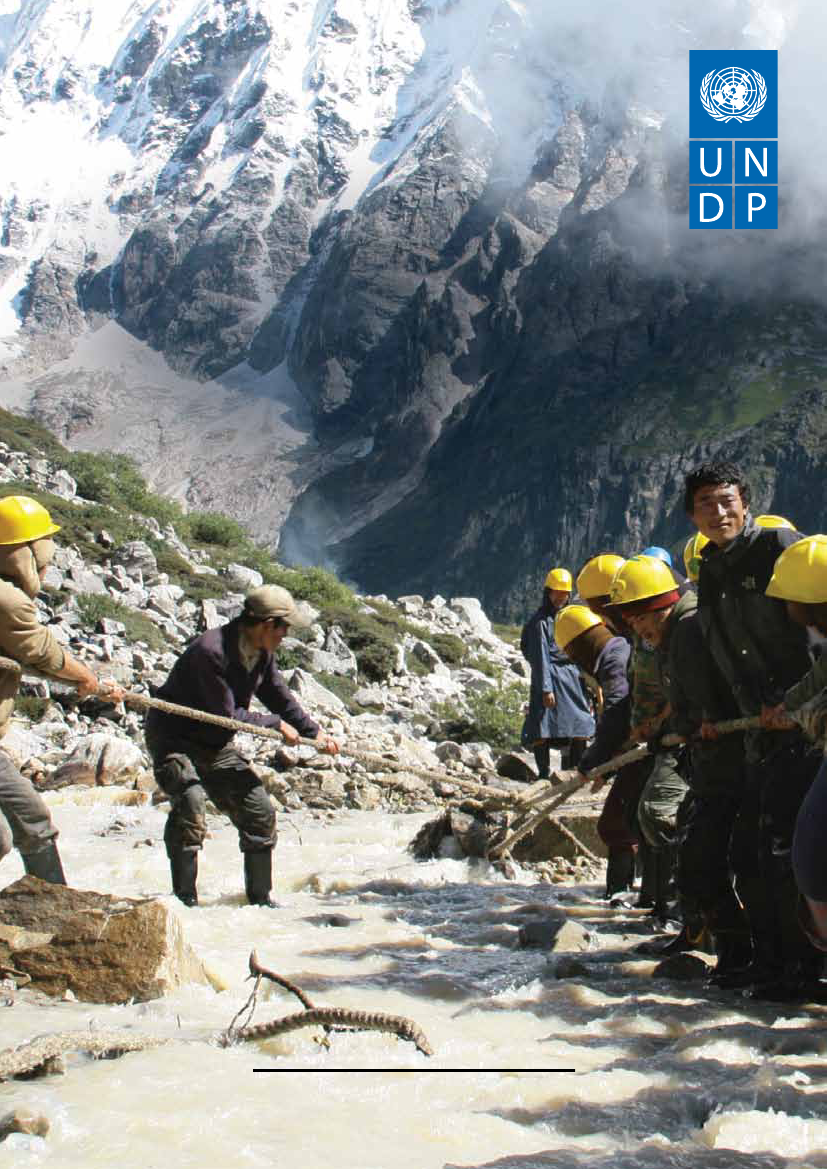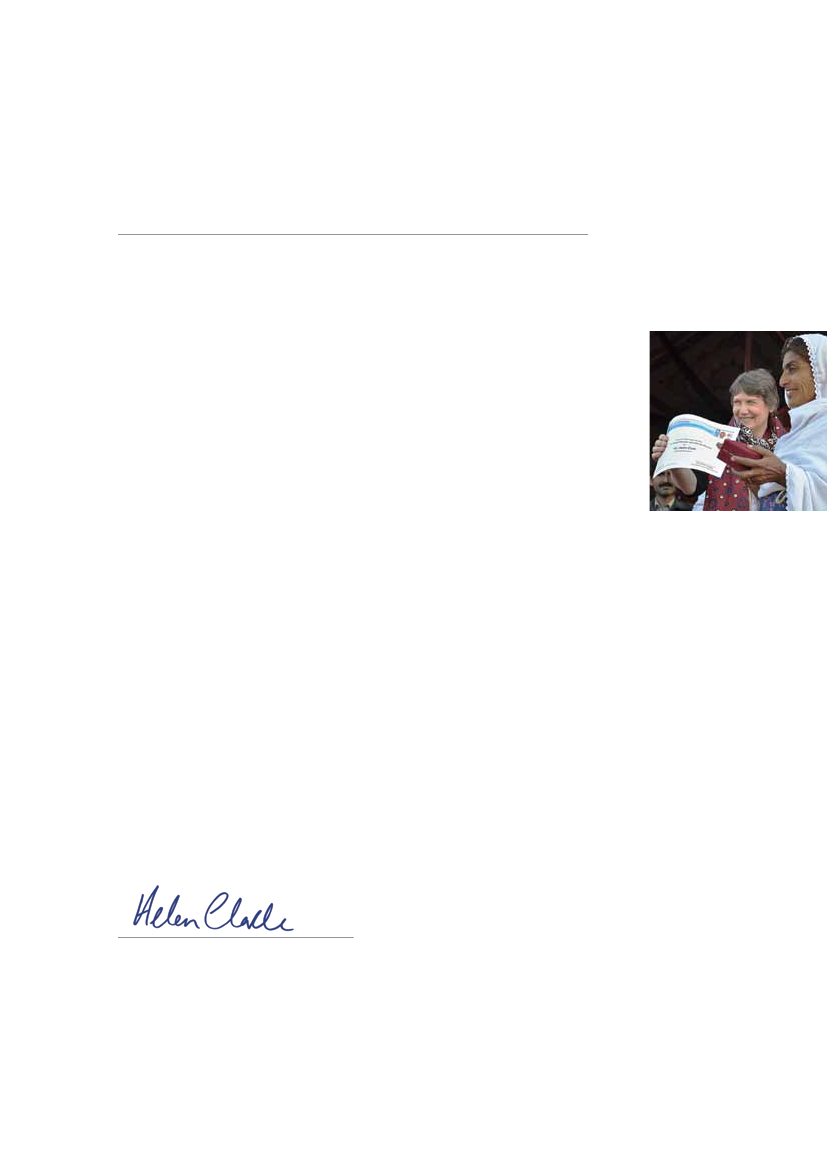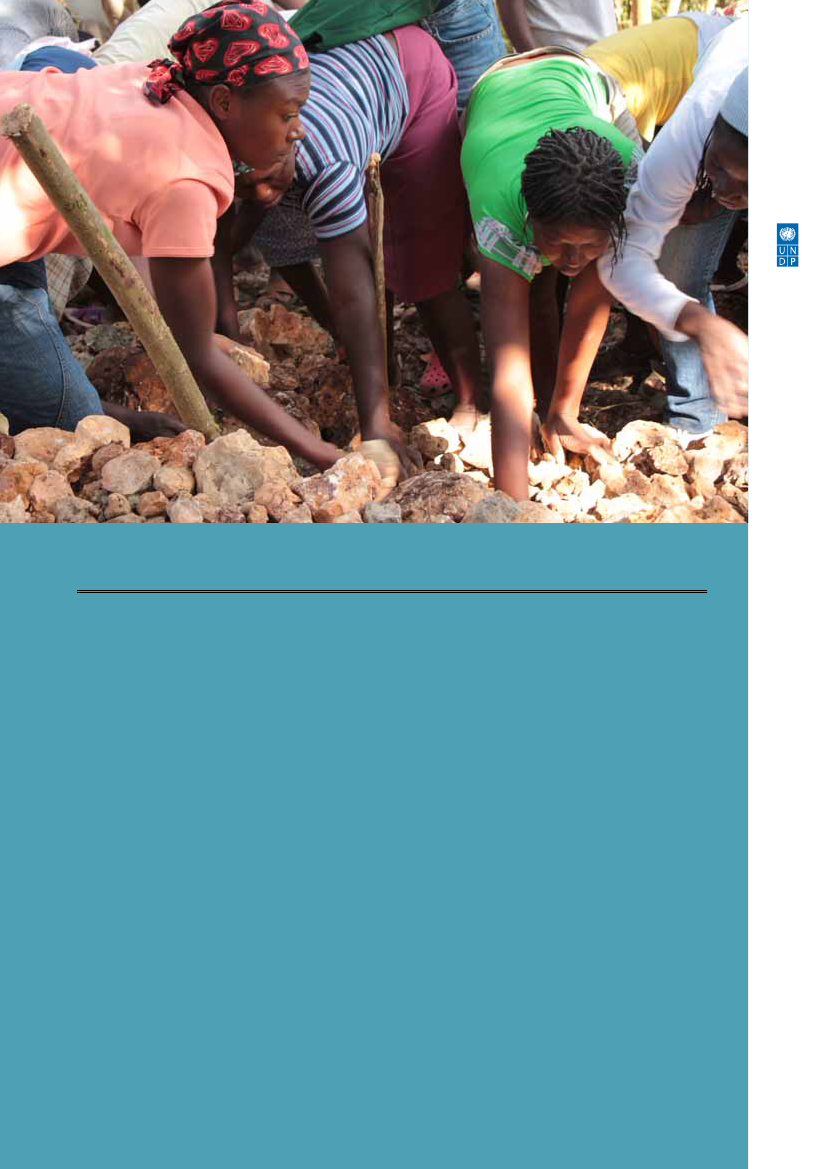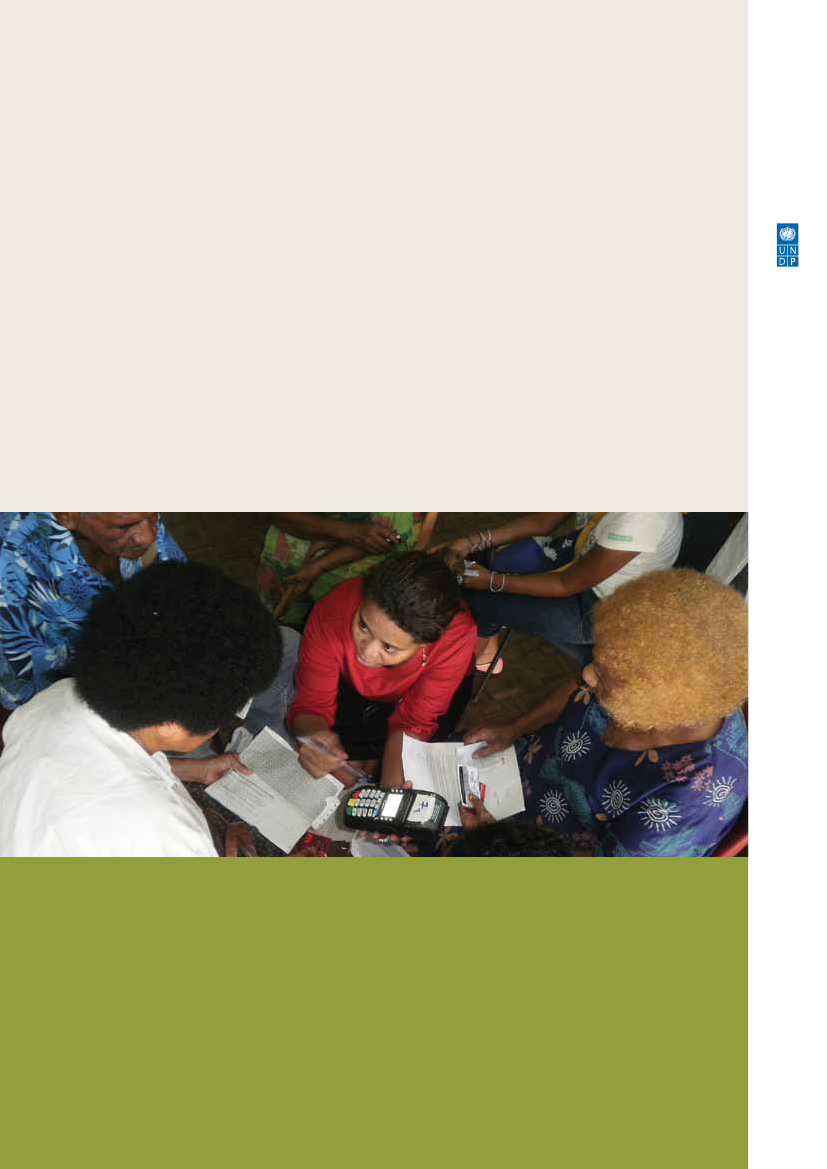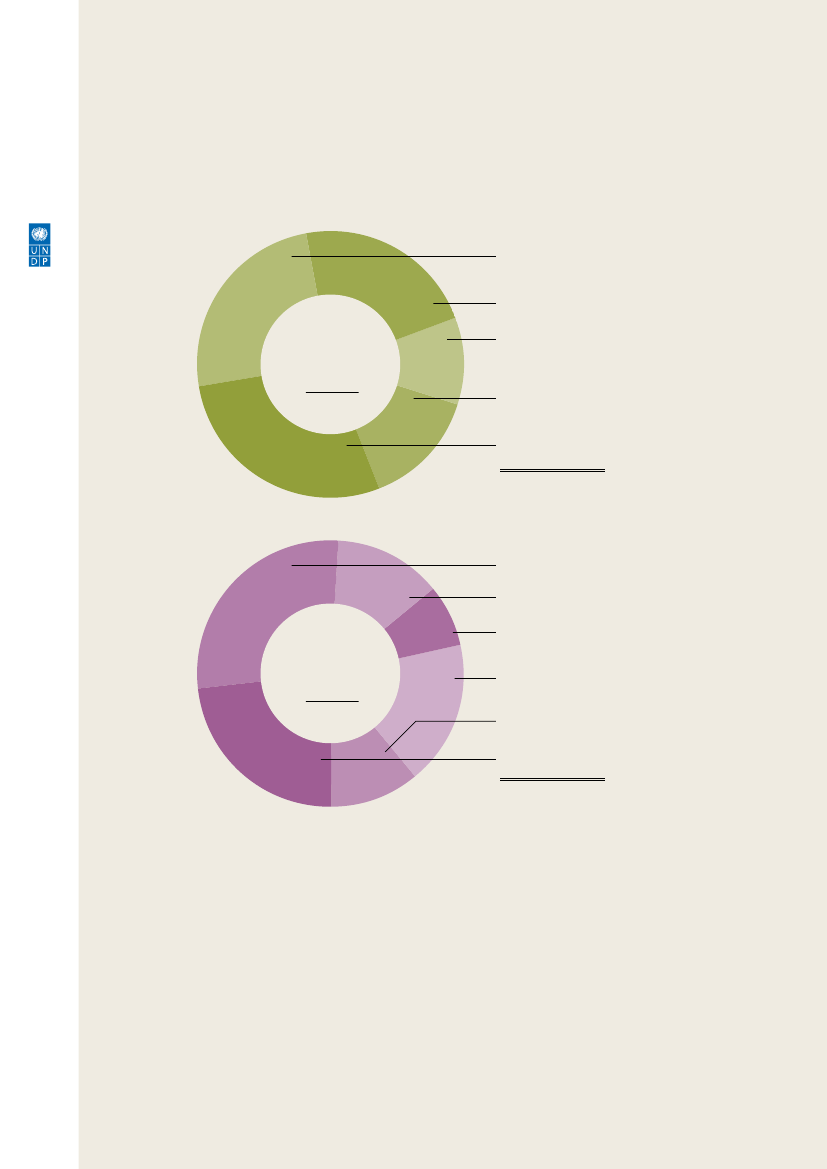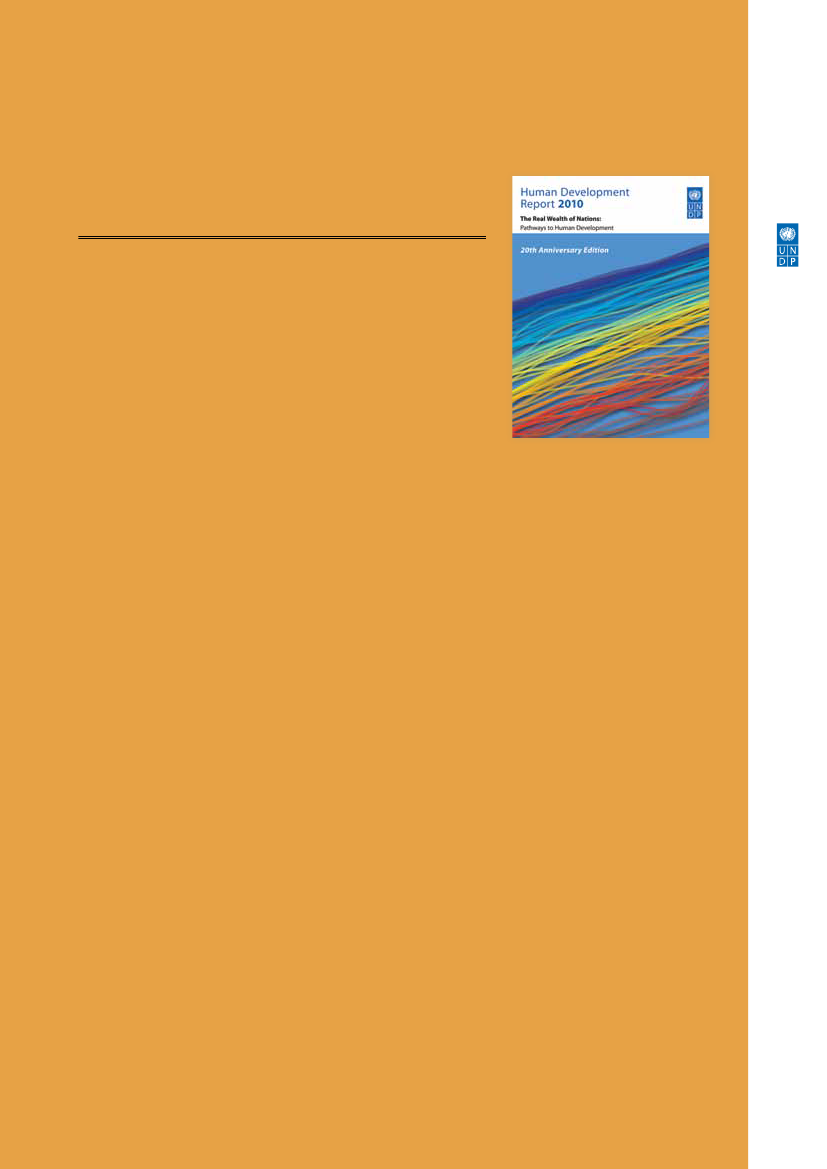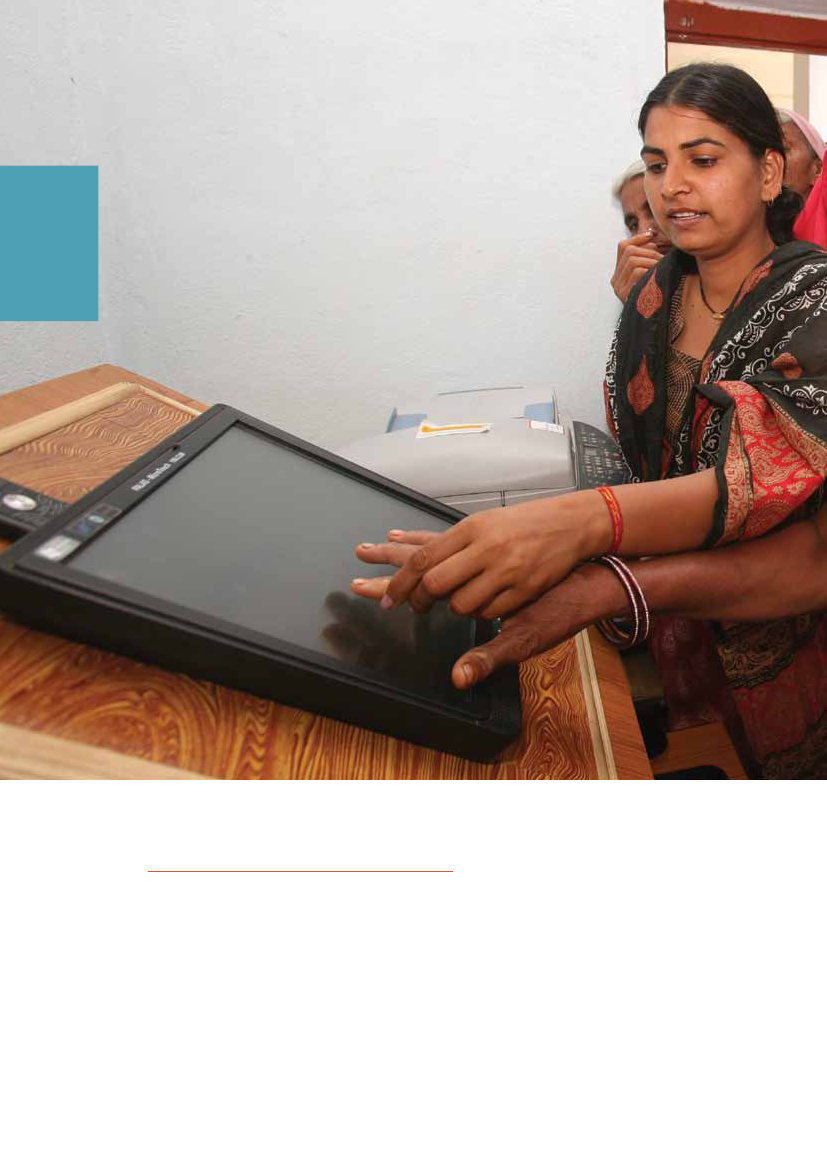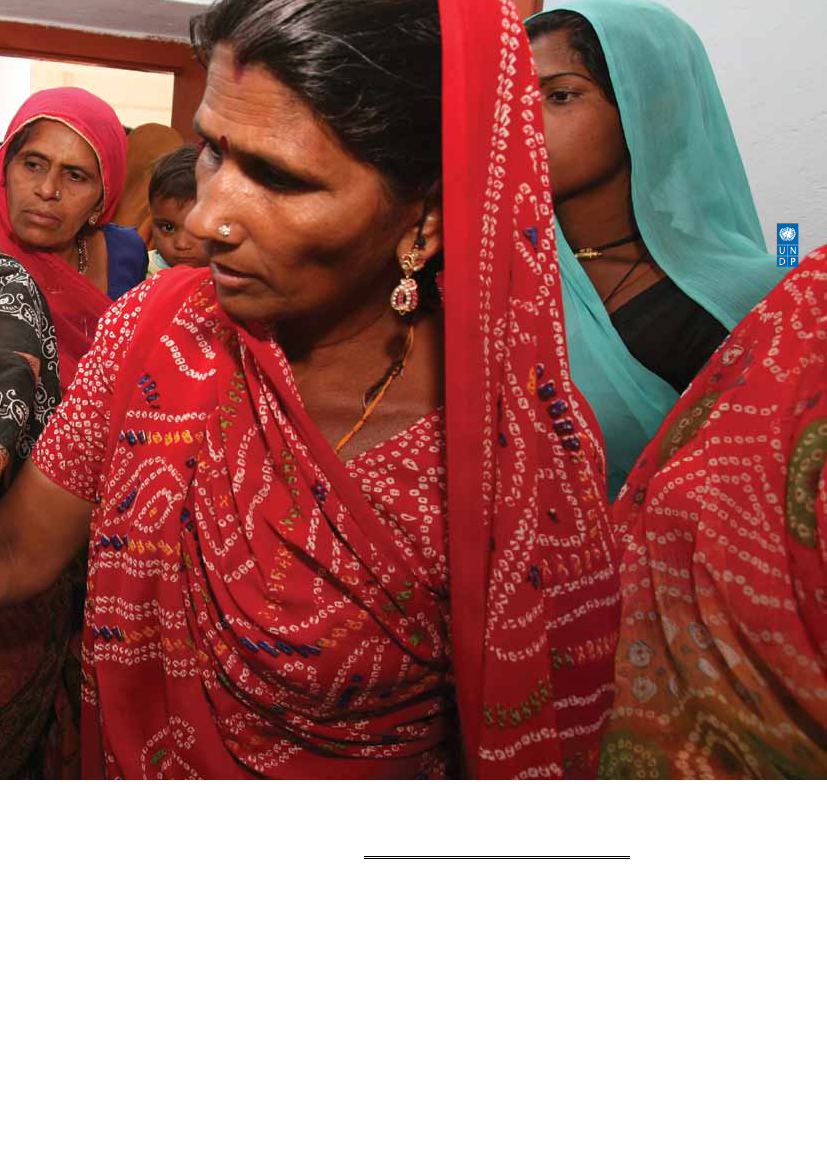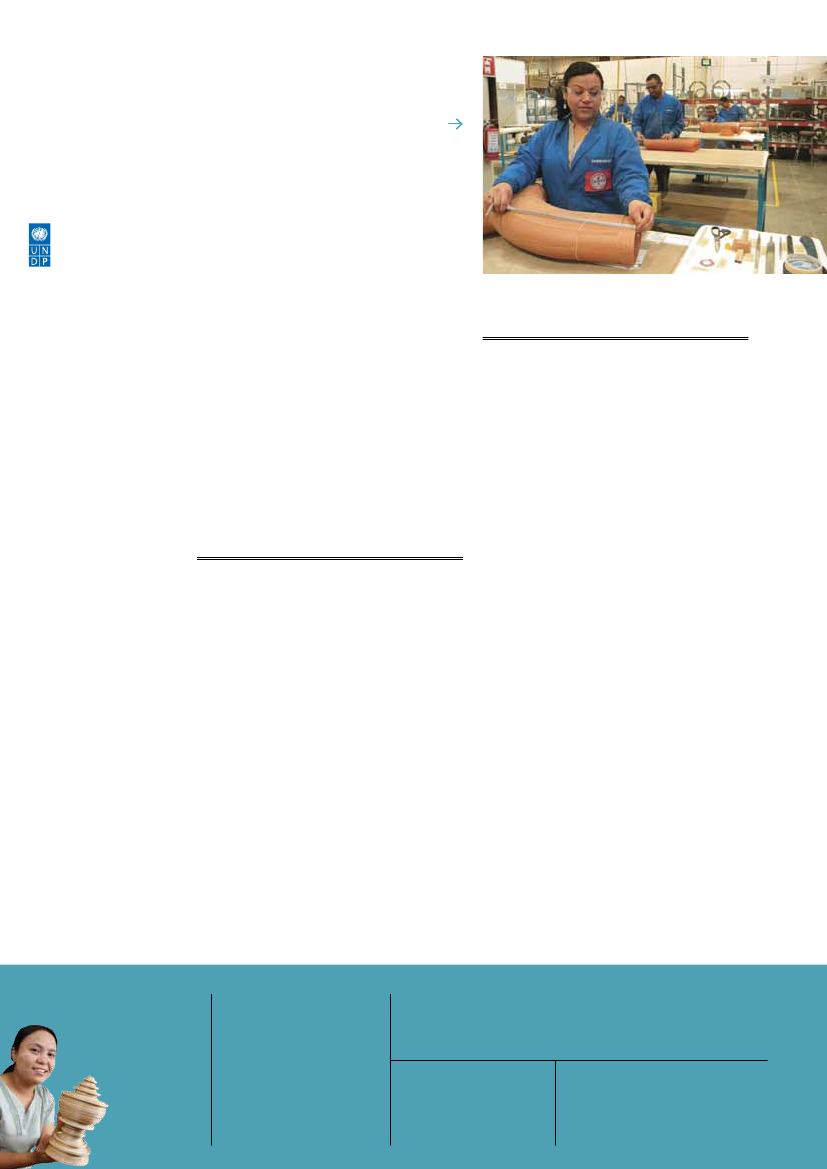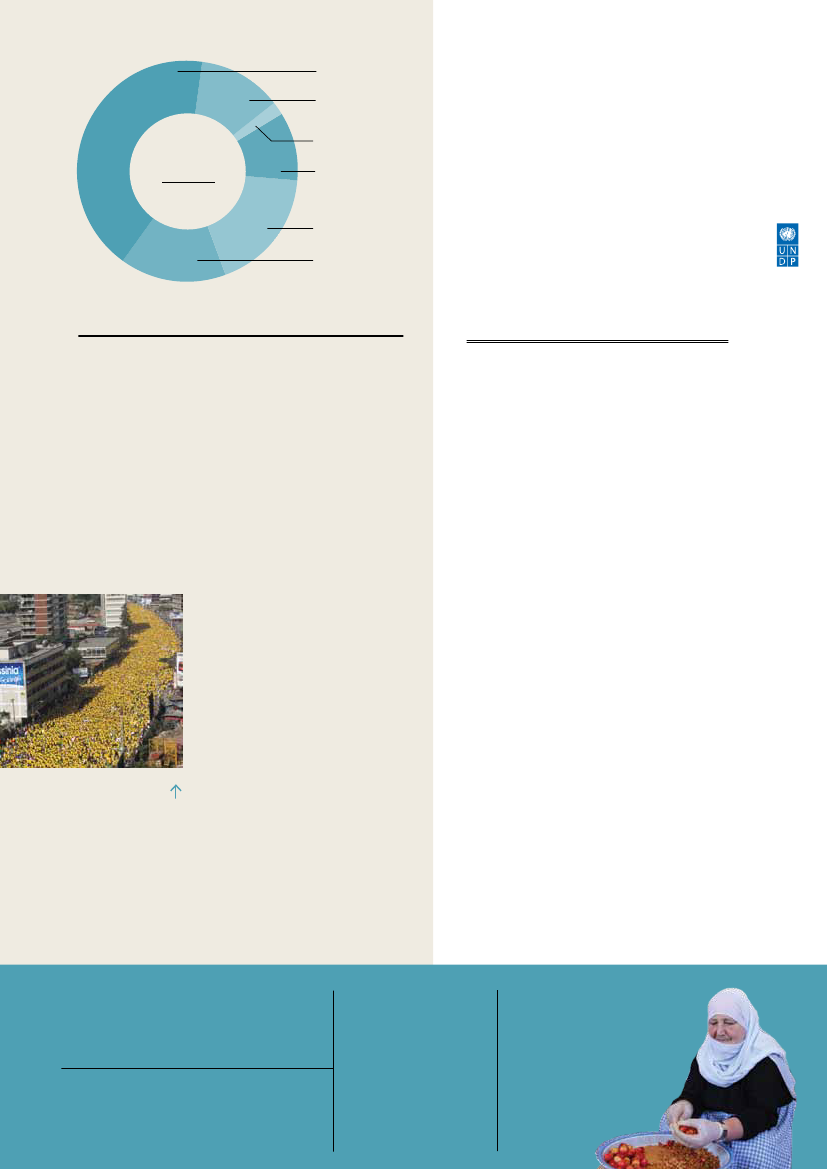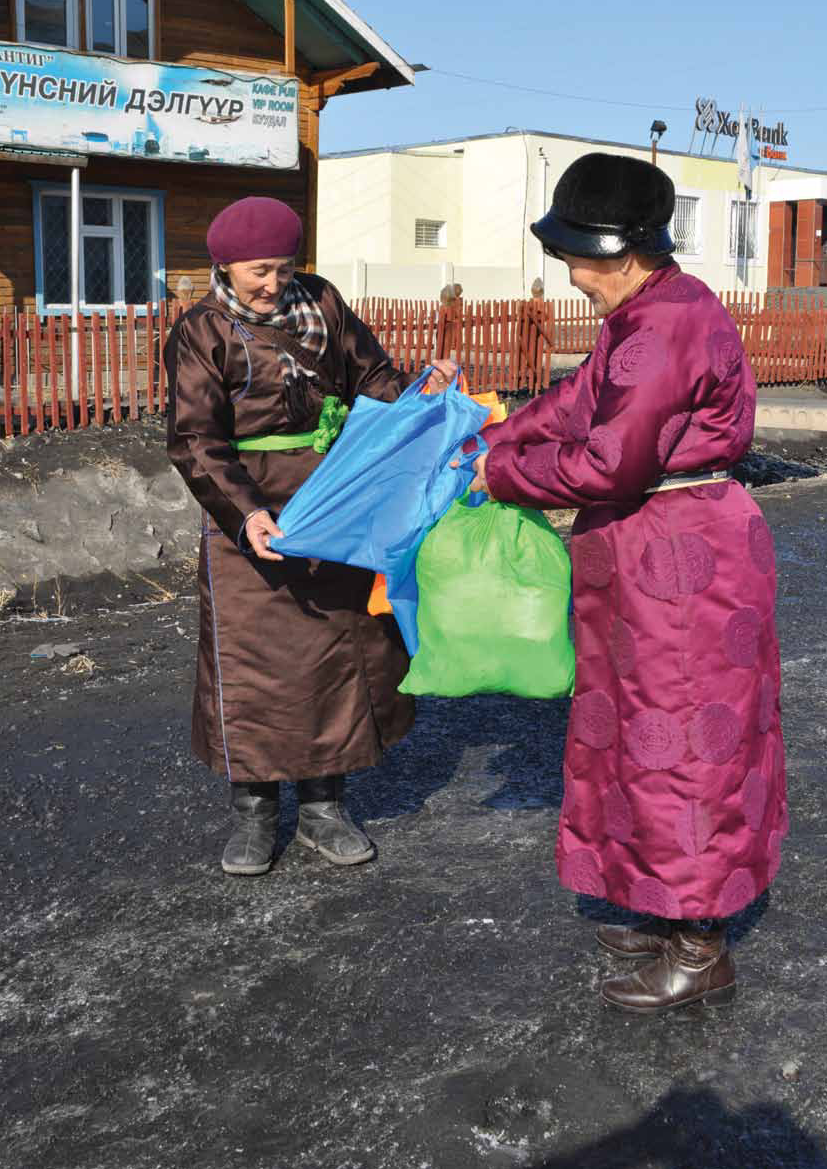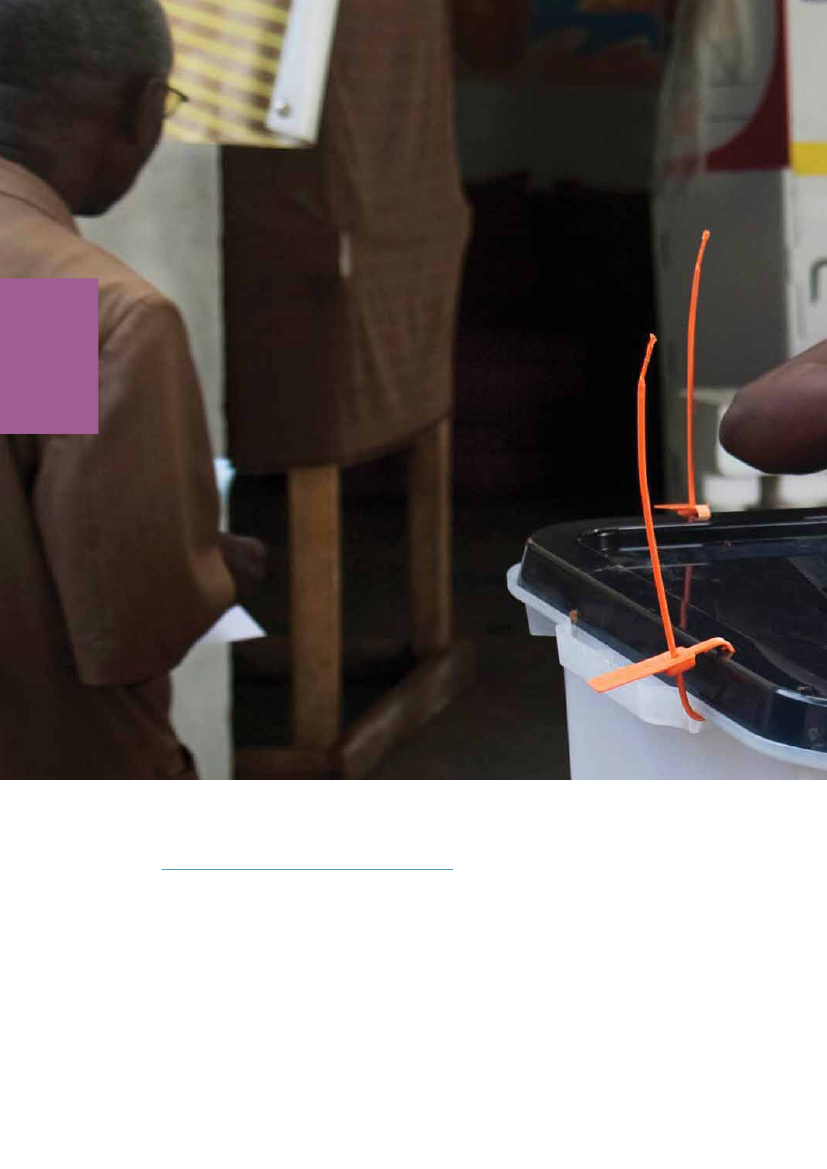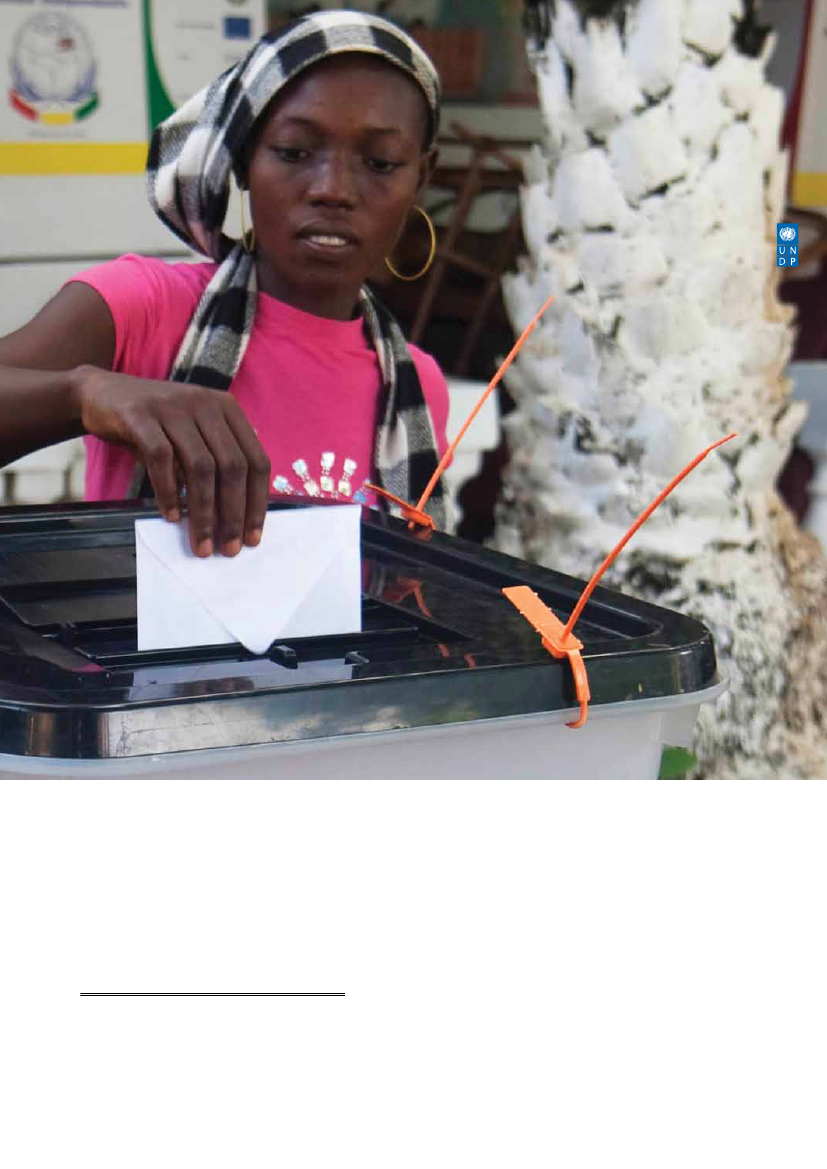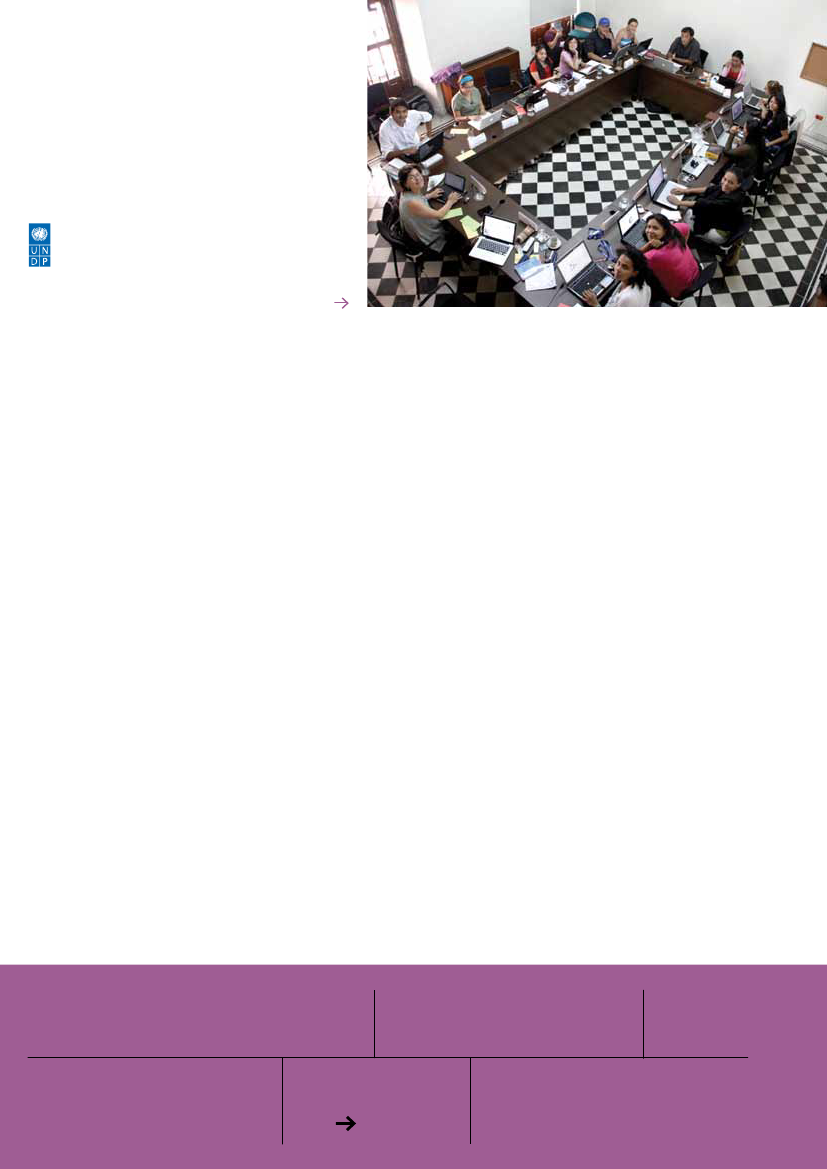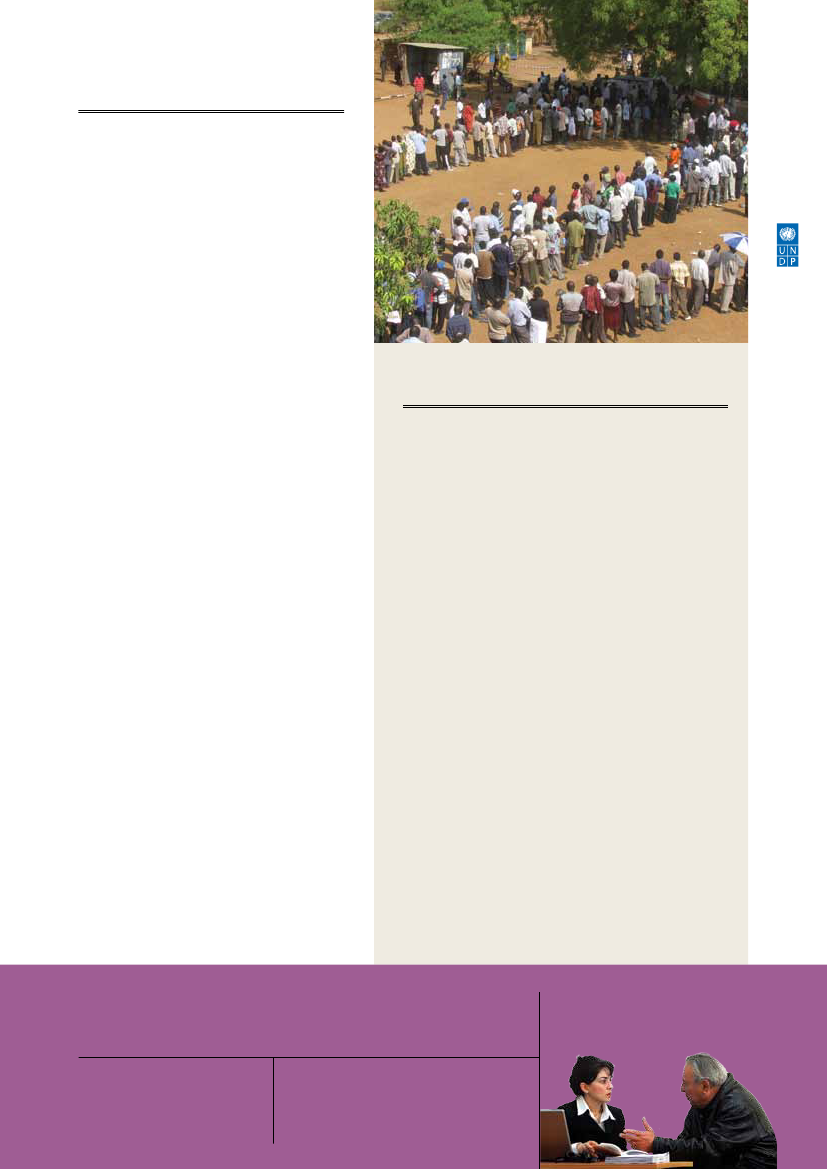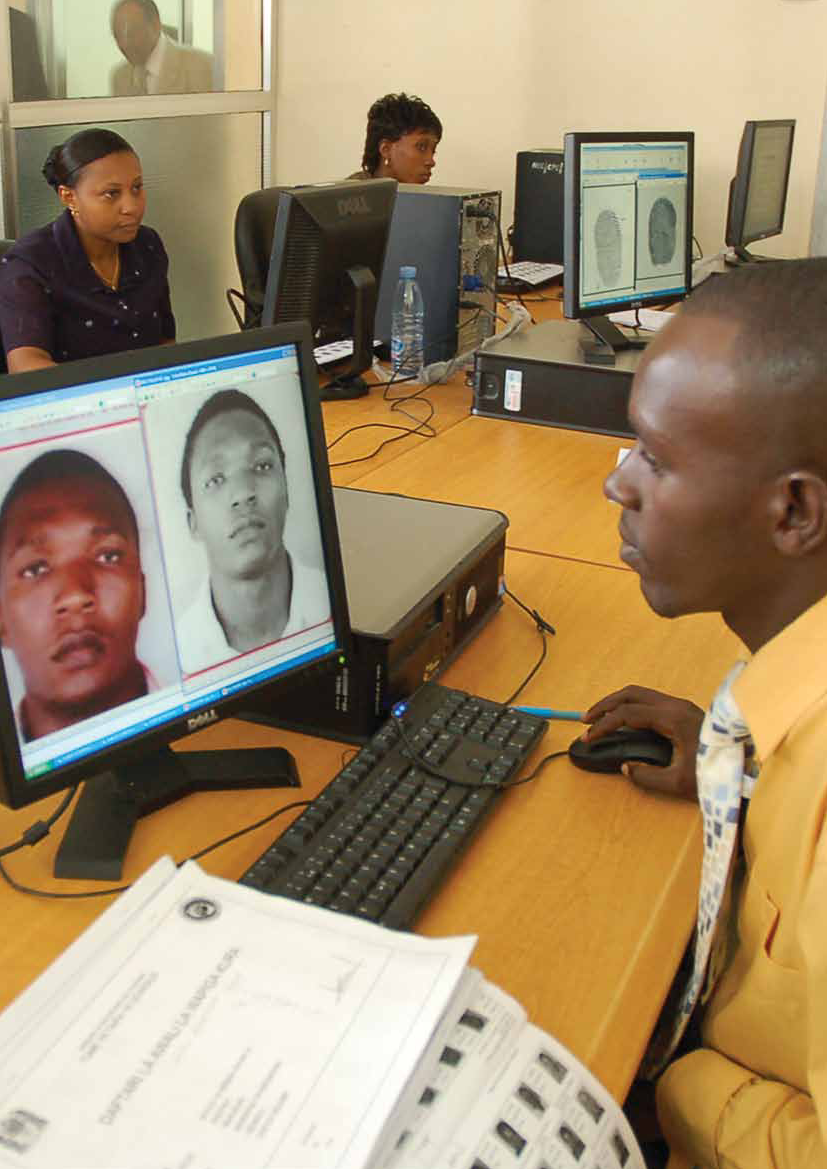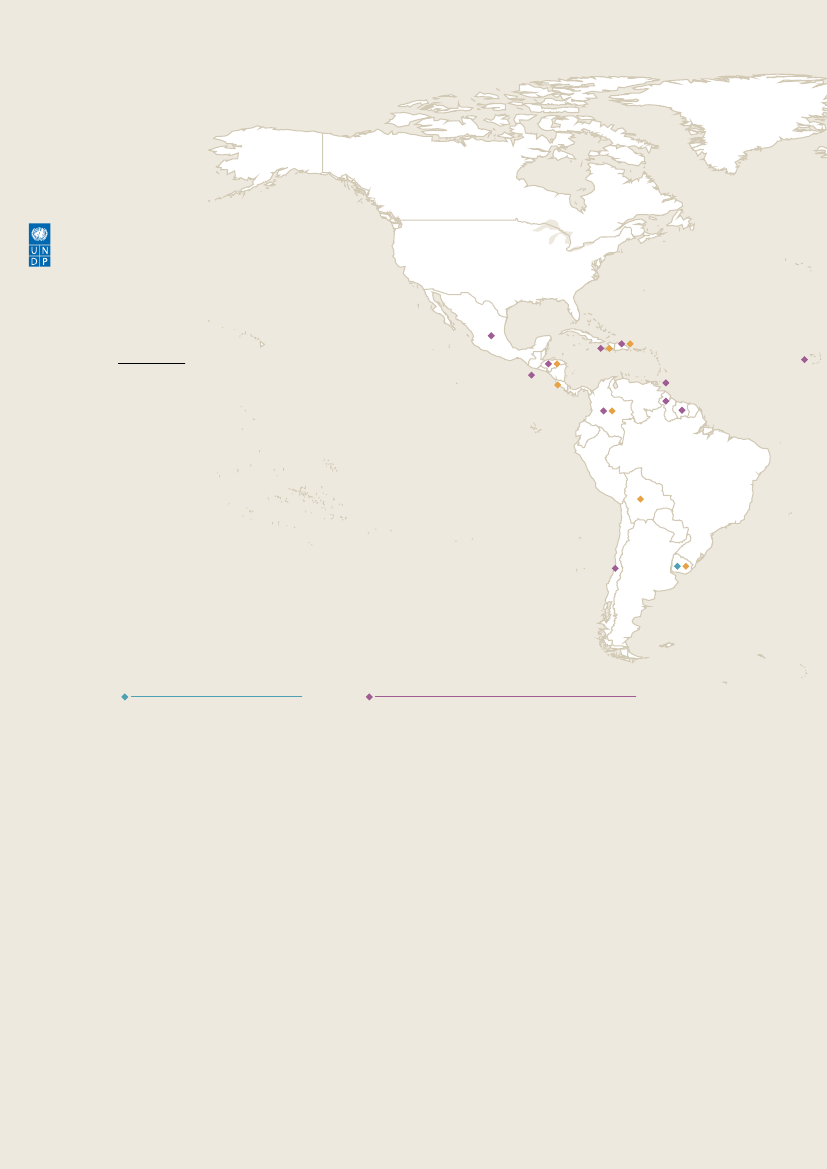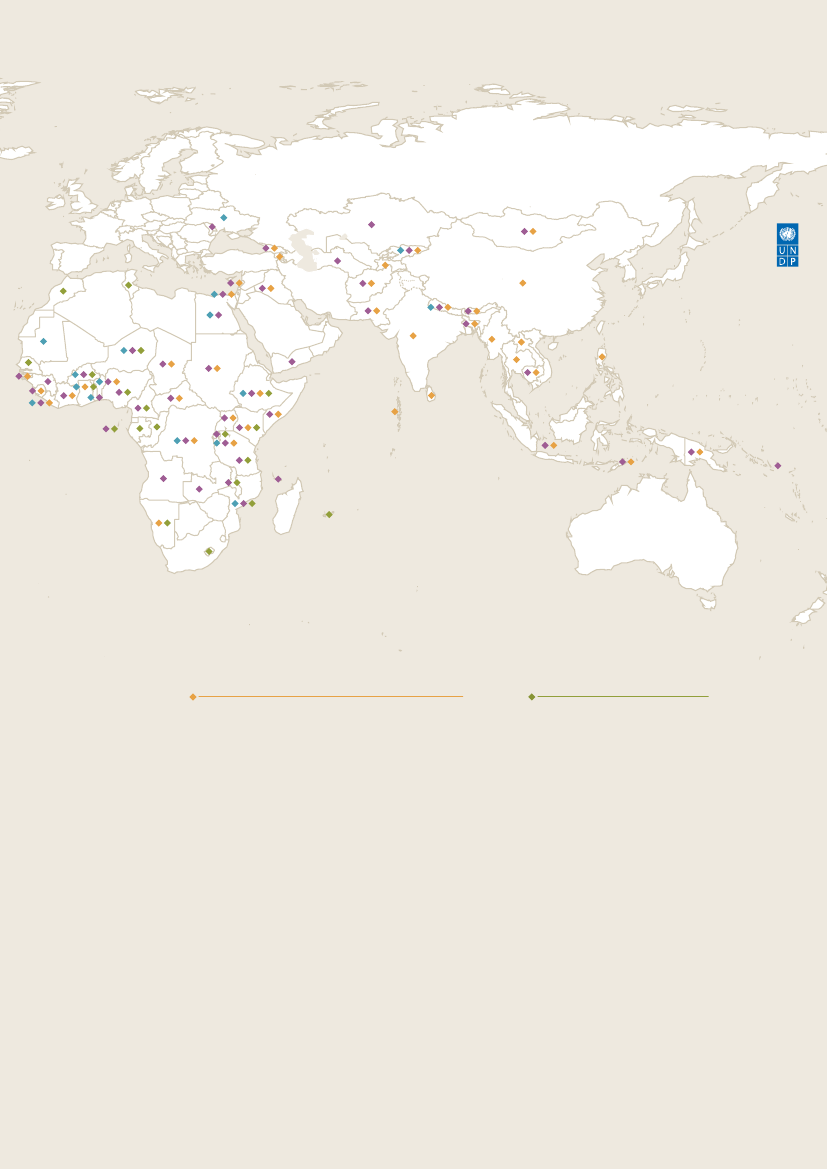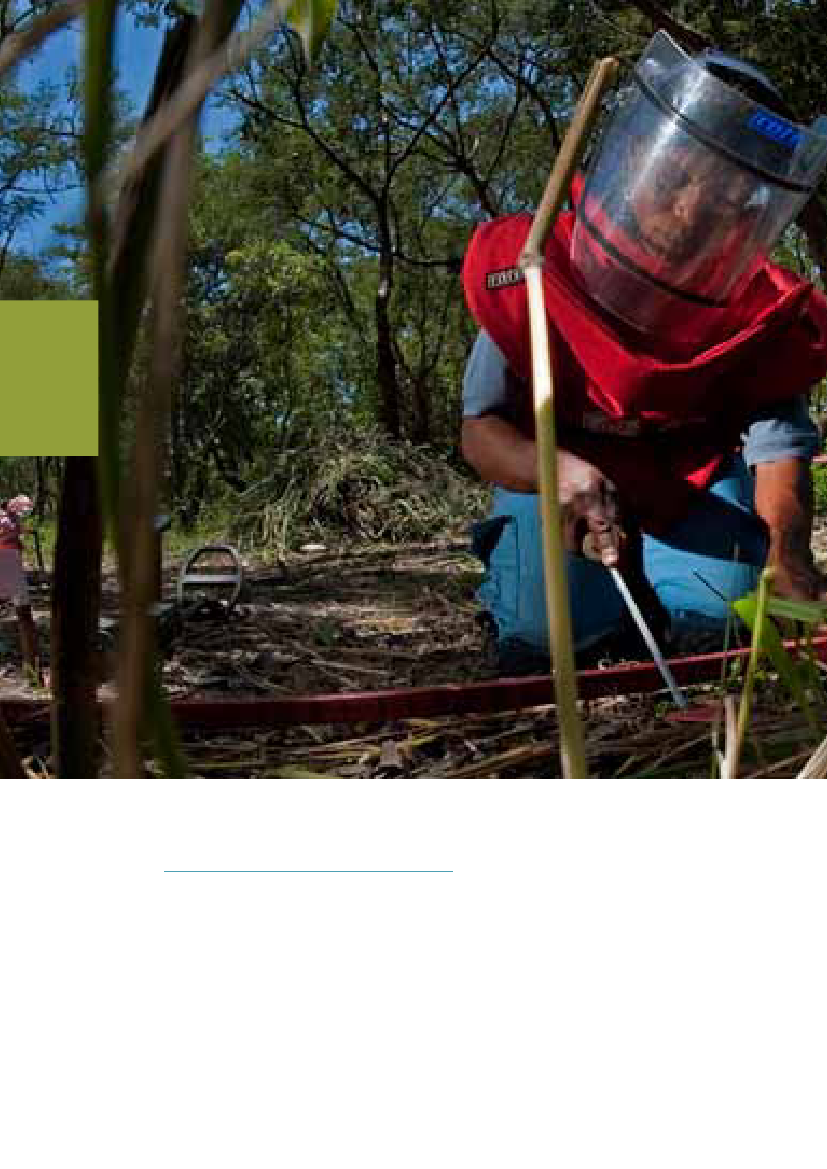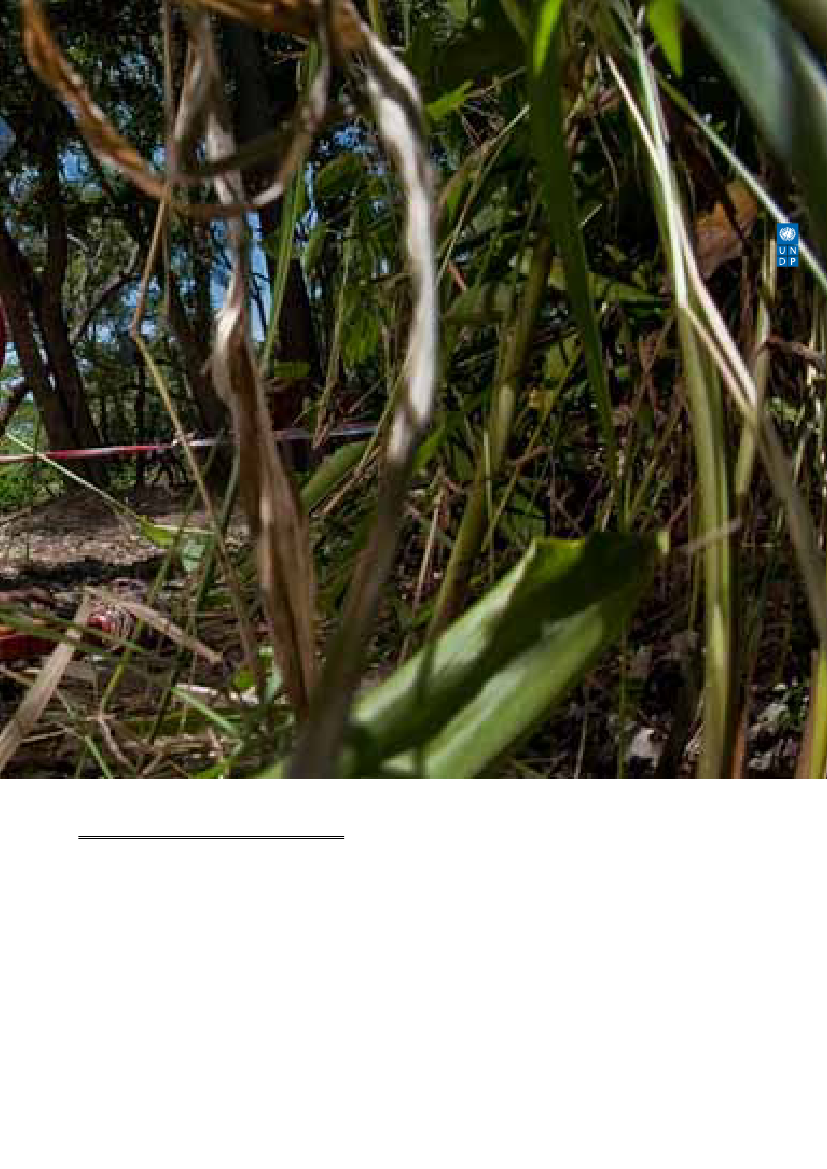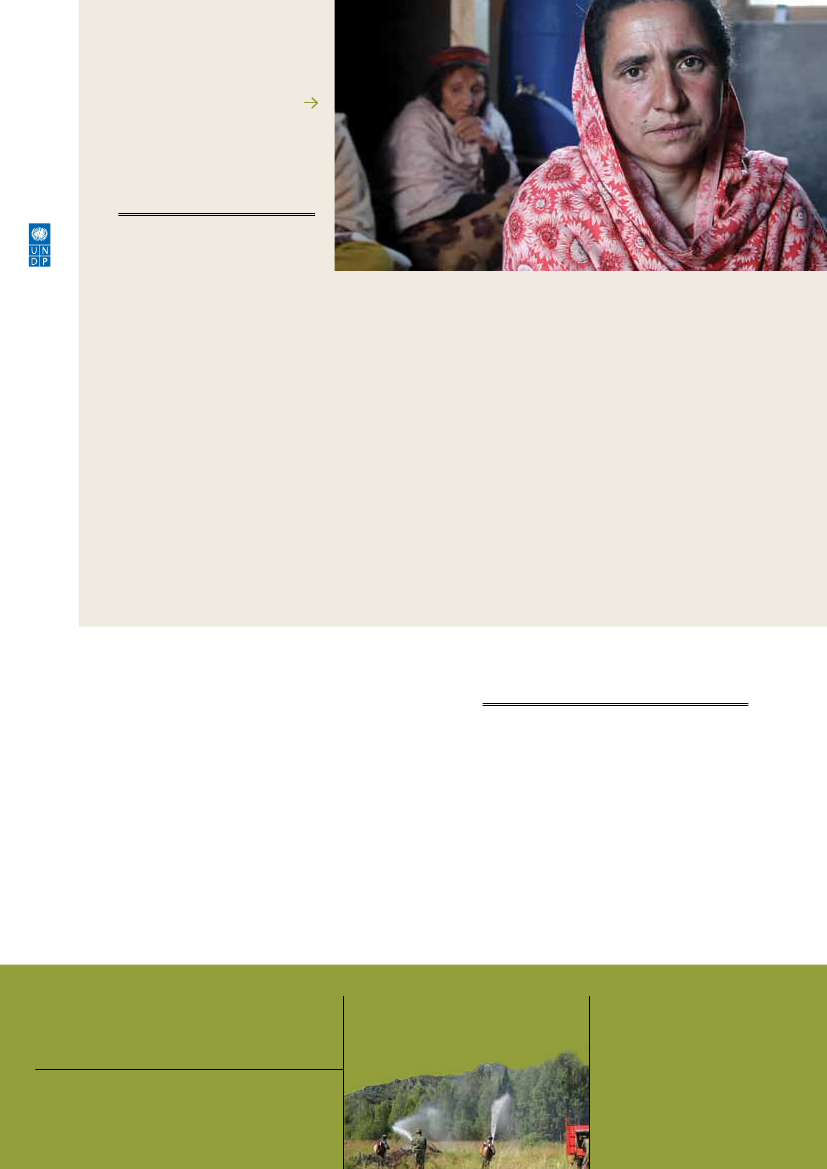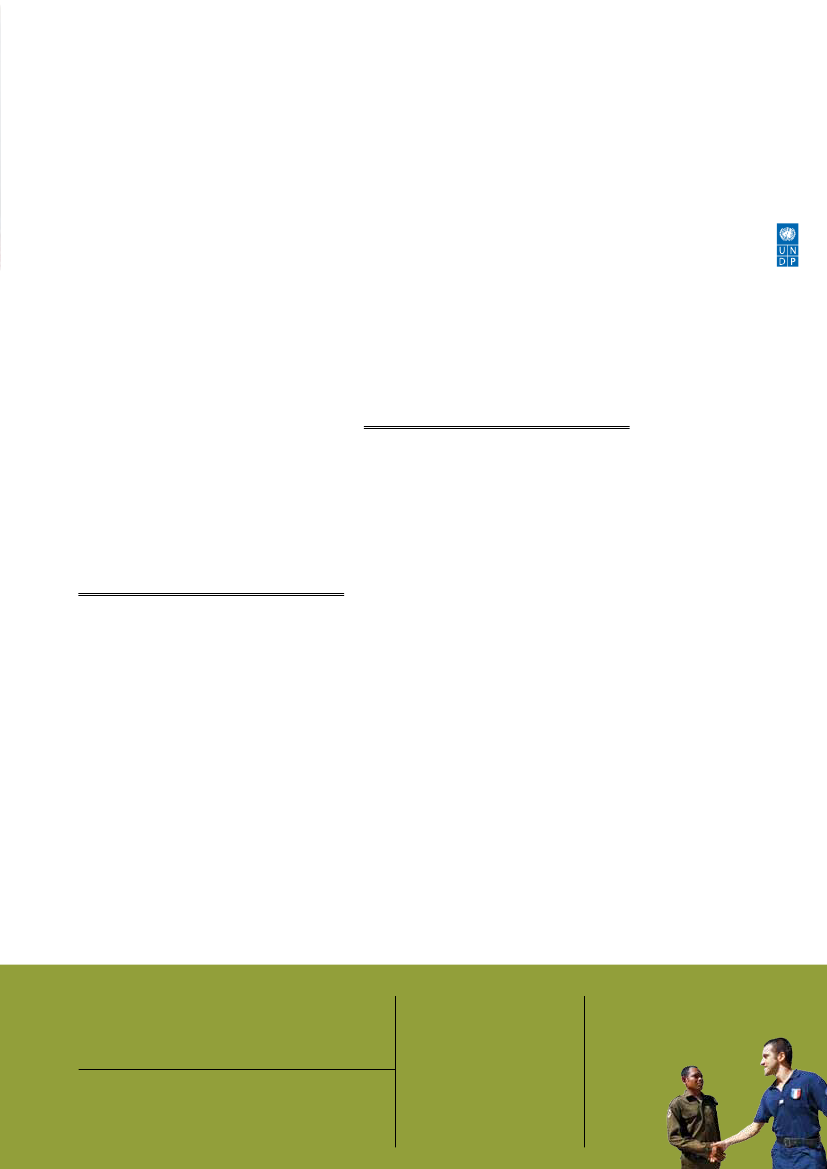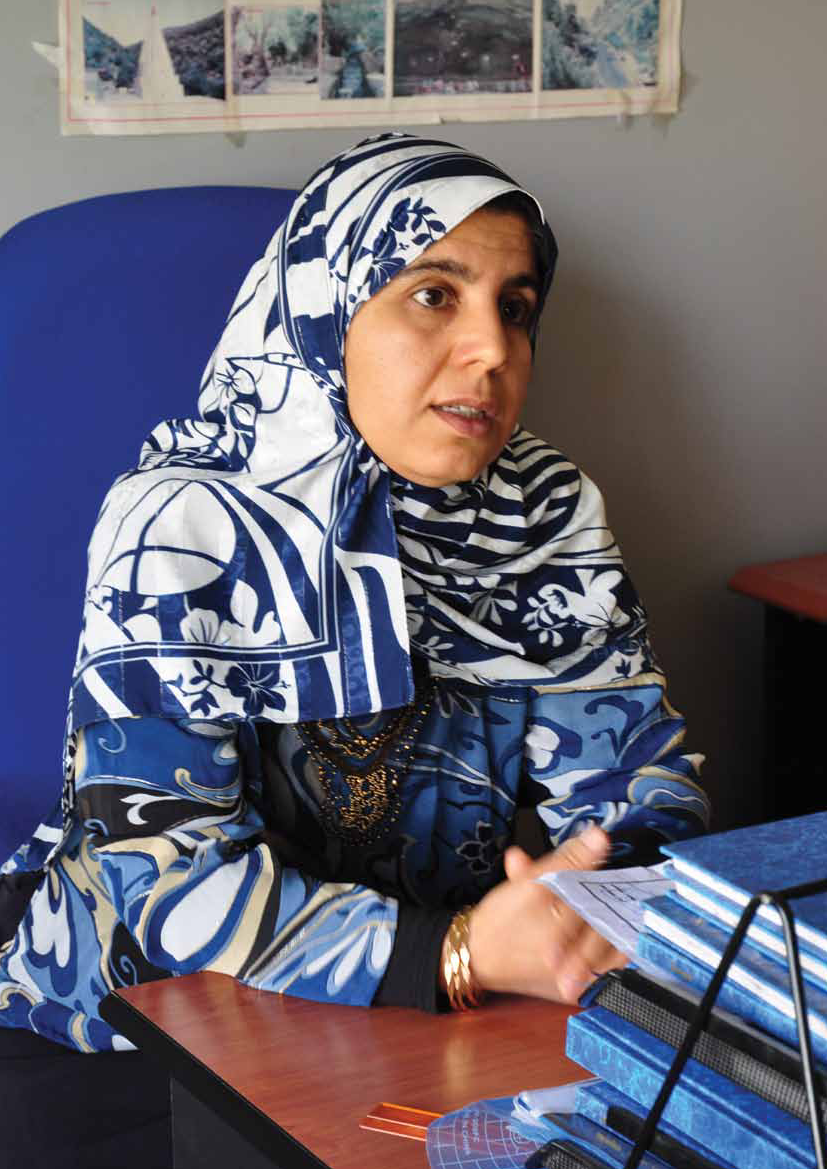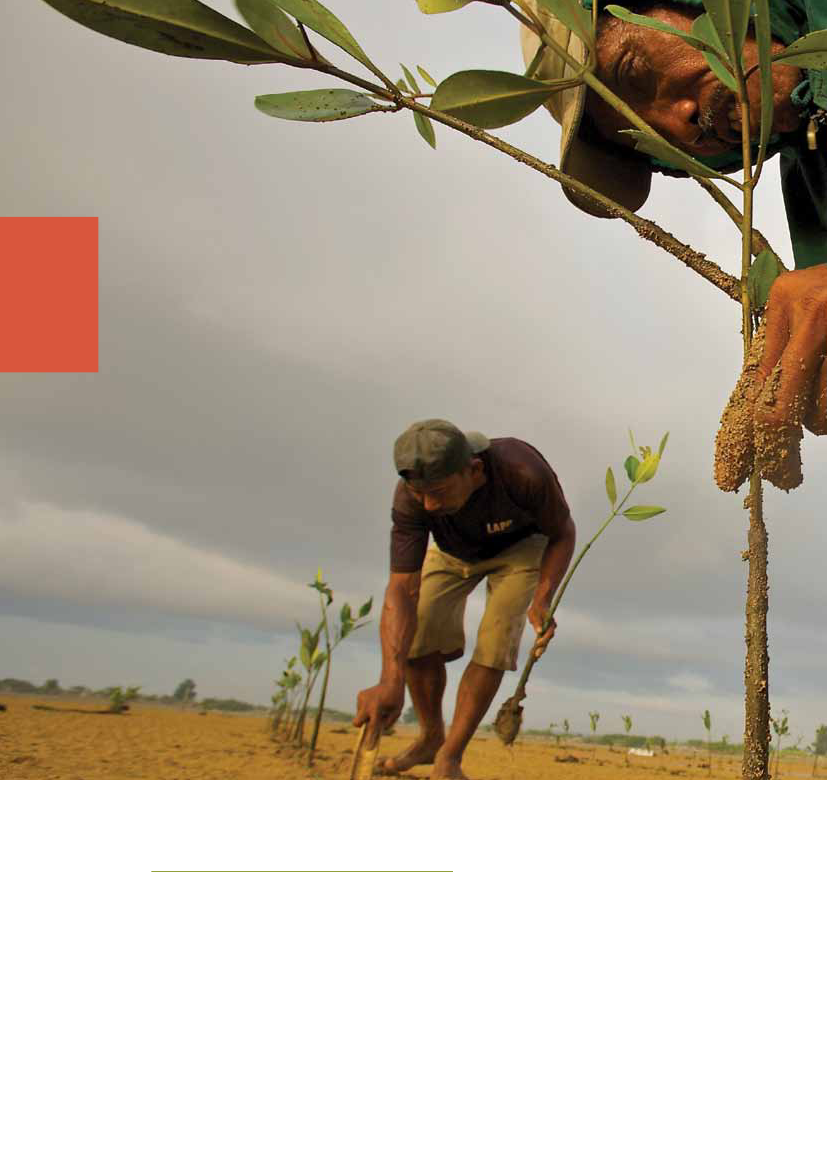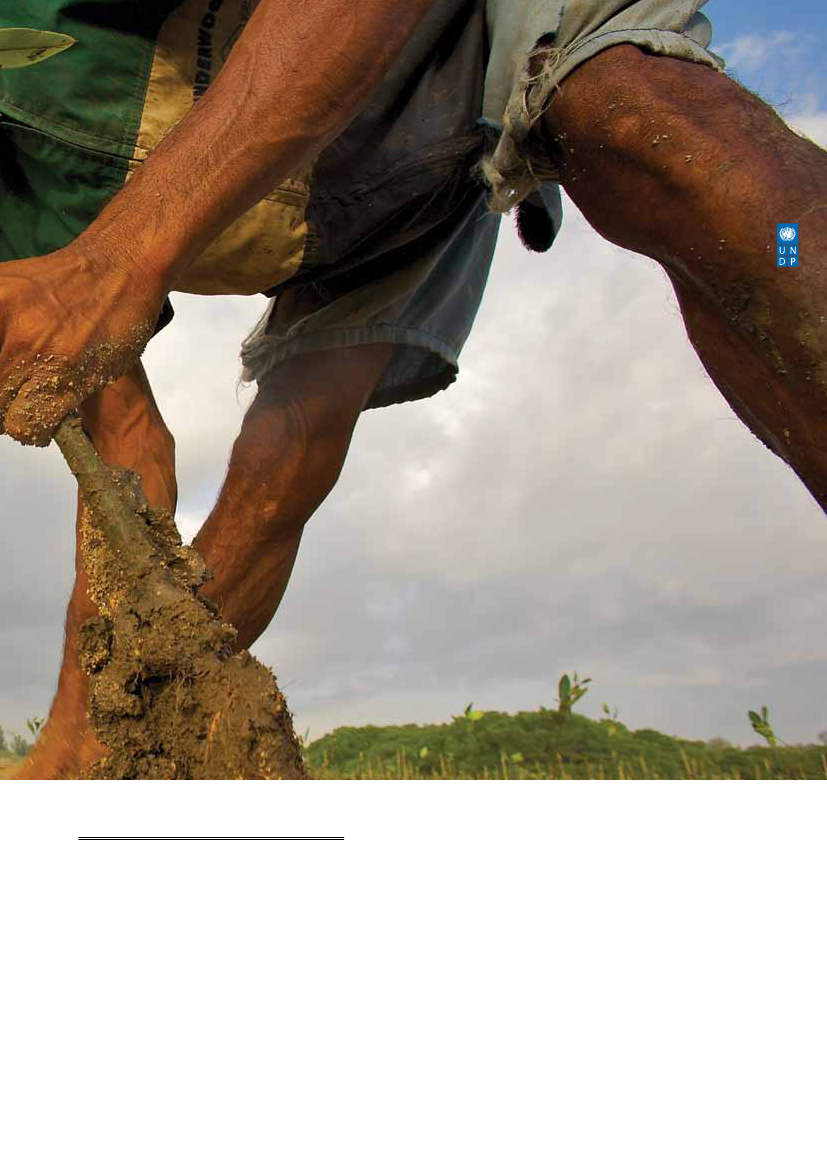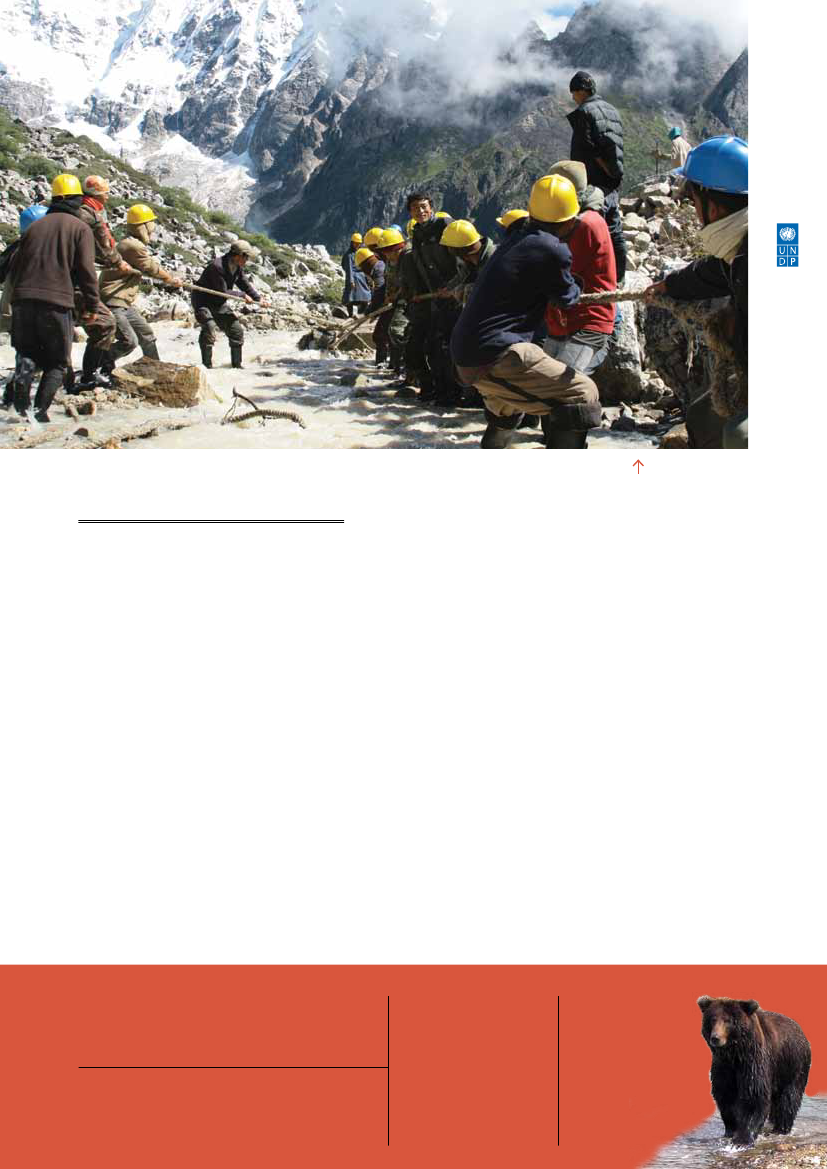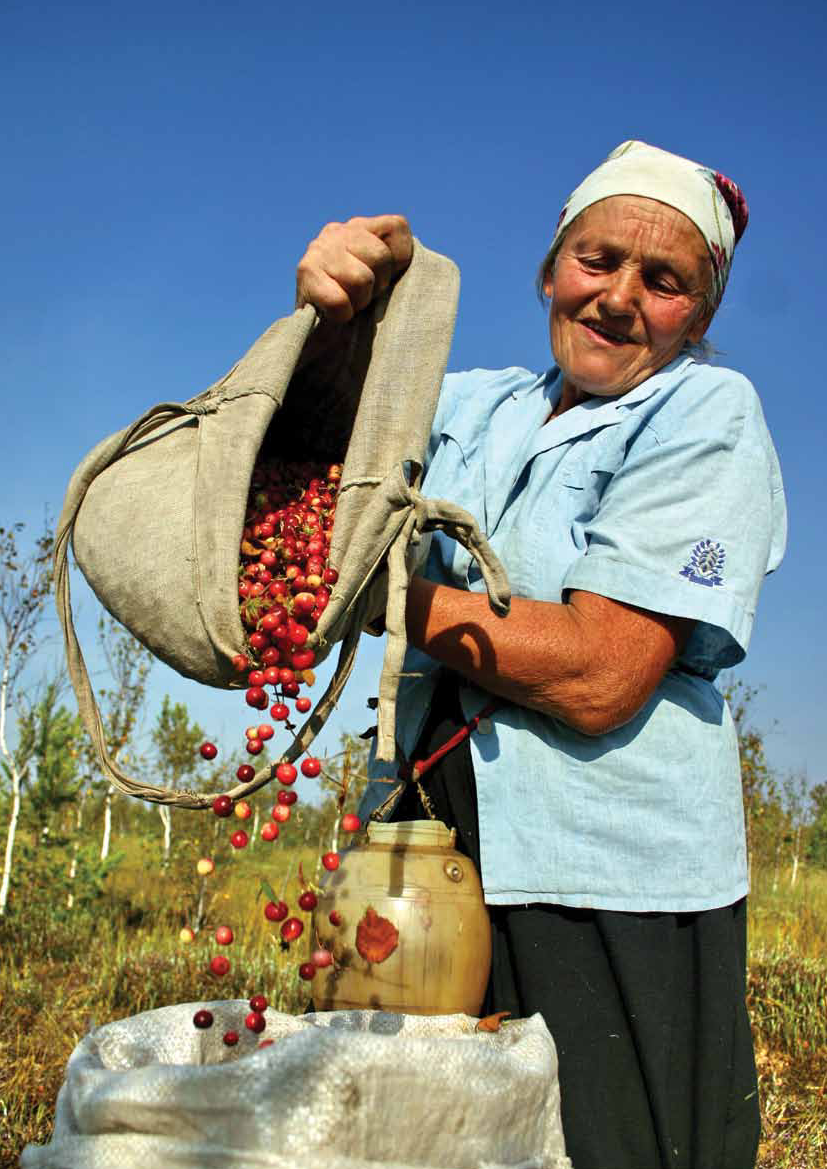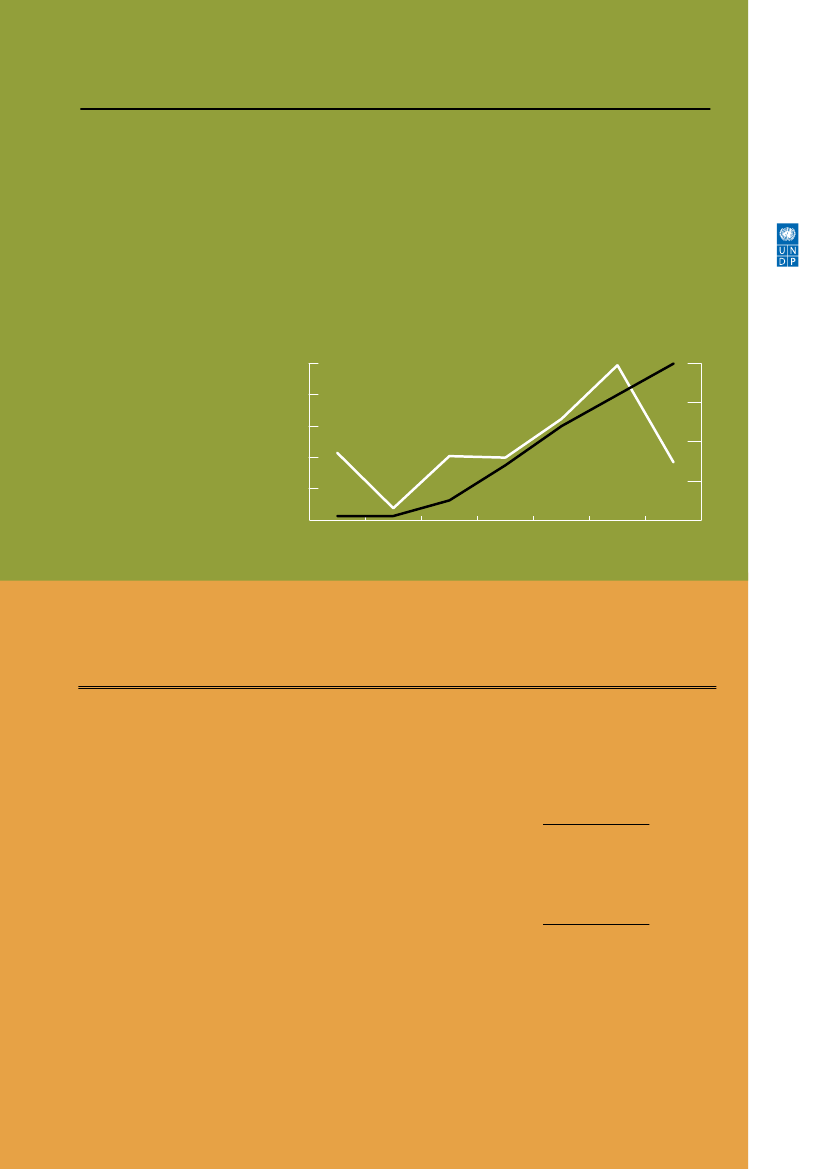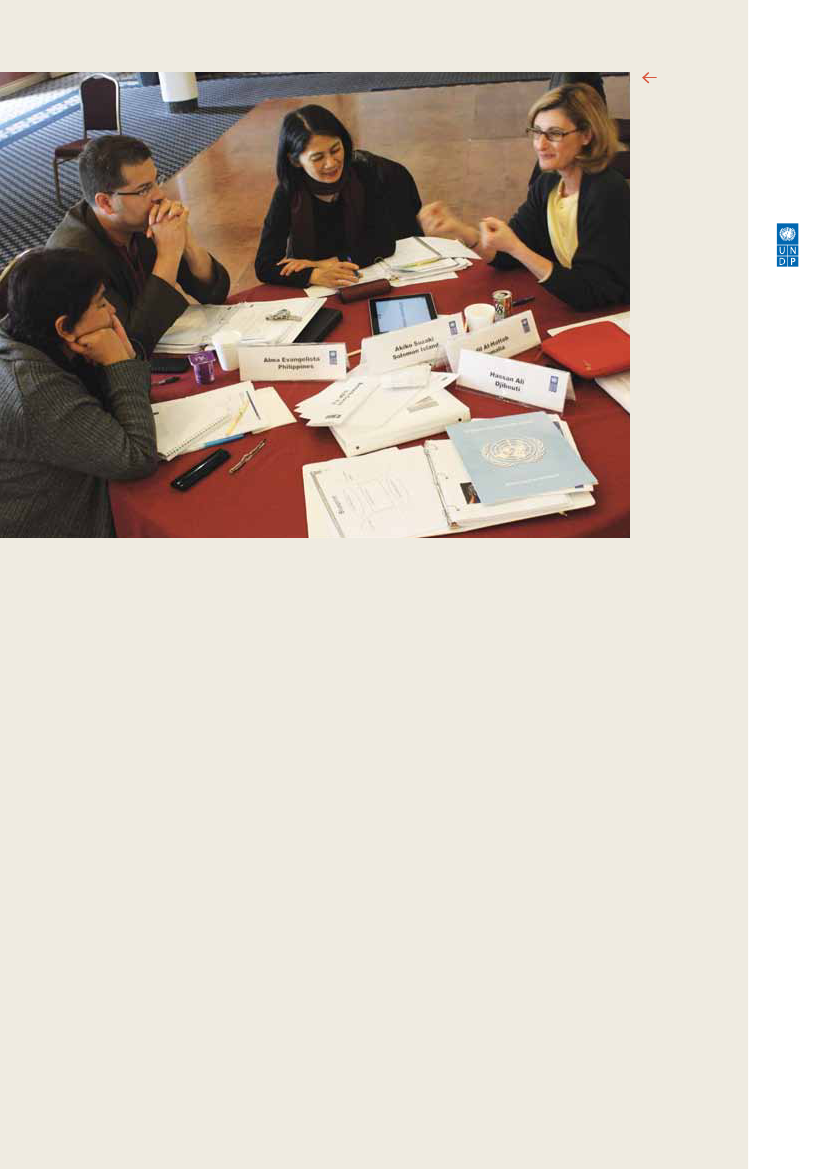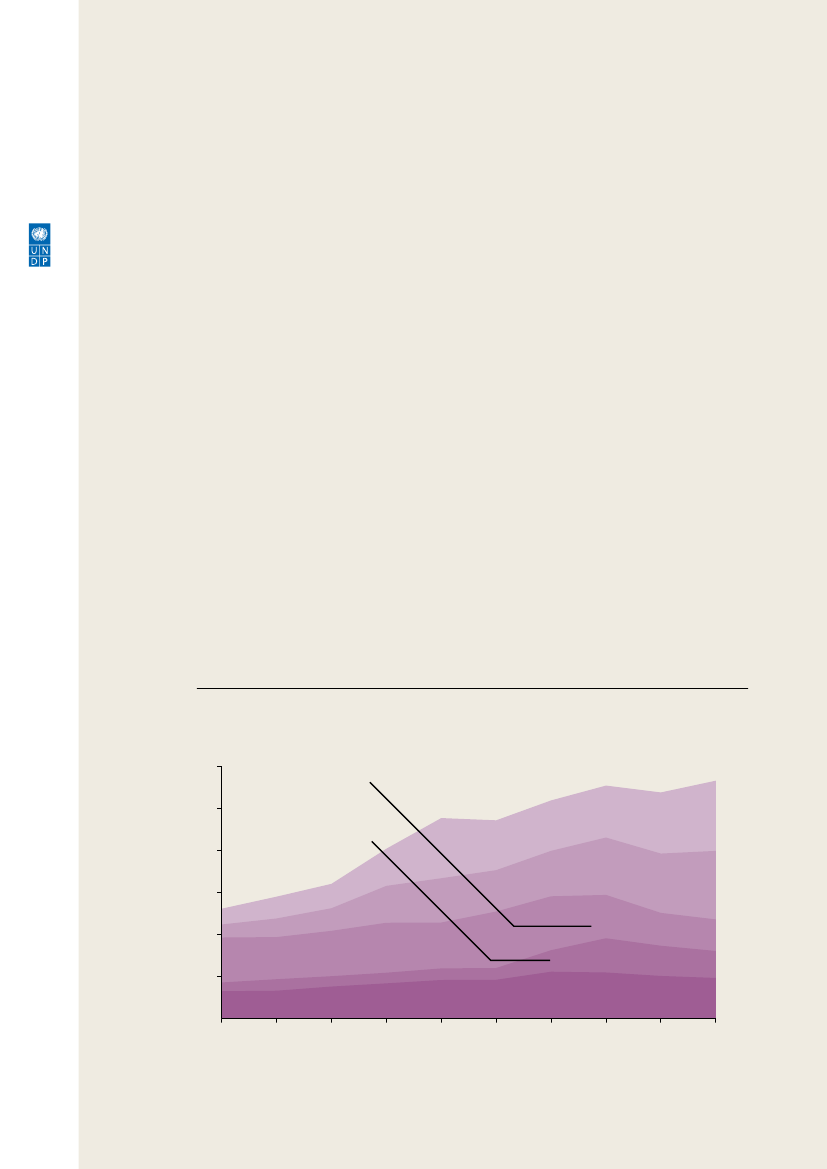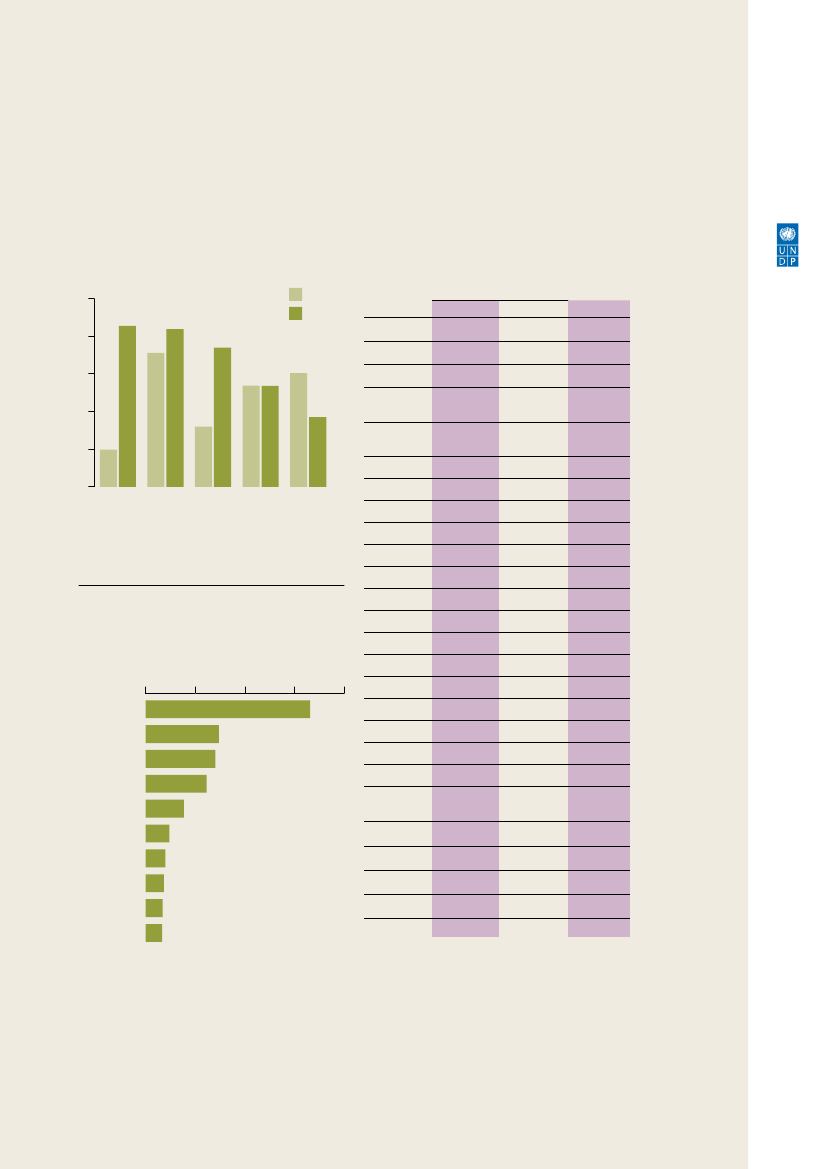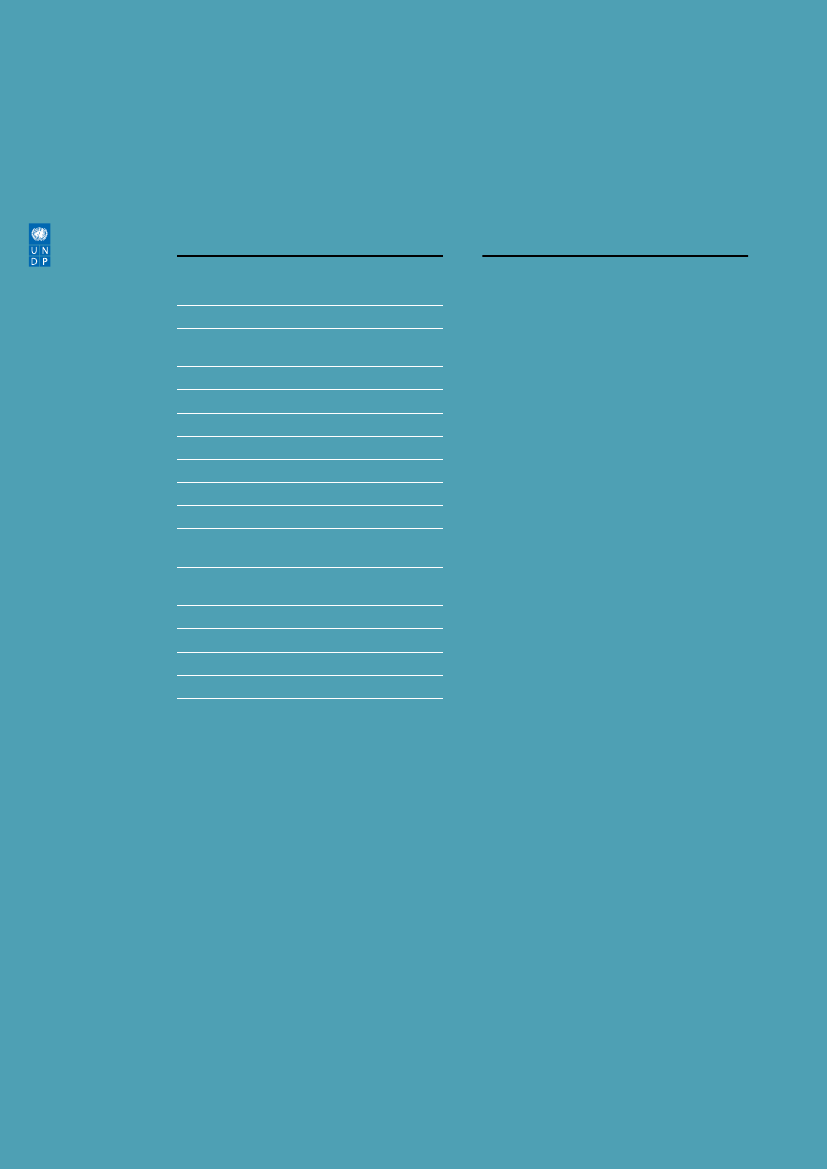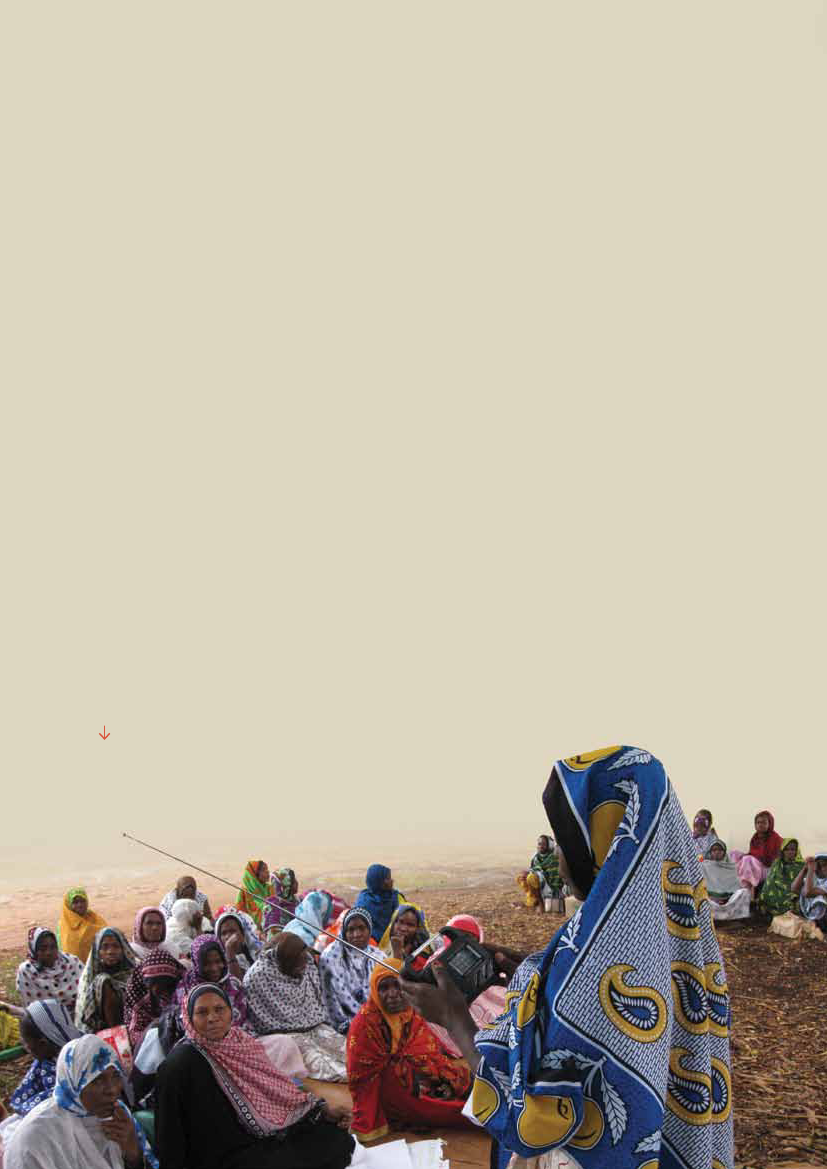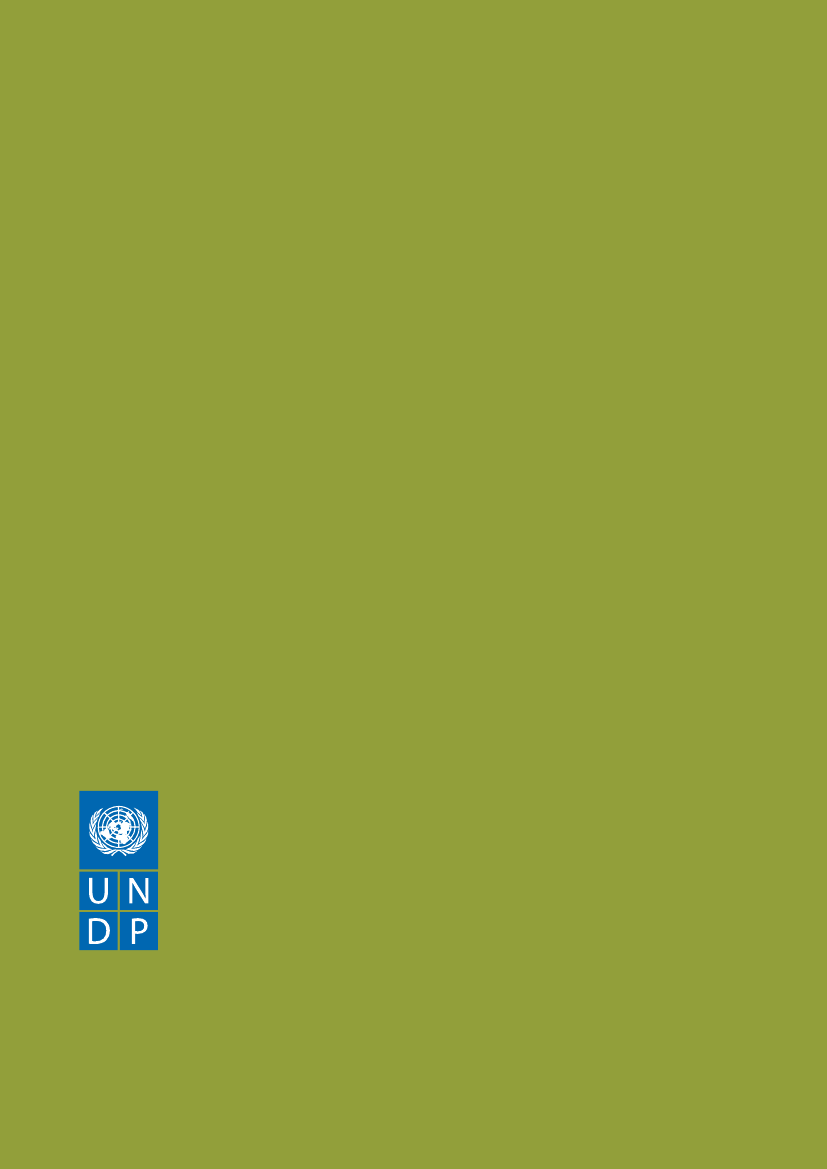Udenrigsudvalget 2010-11 (1. samling)
URU Alm.del Bilag 206
Offentligt
People-centredDevelopmentEmpowered lives. Resilient nations.
UNDP in Action – Annual Report 2010/2011
U n i t e d n at i o n s d e v e lo p m e n t p r o g r a m m e
CoVeR PHoto:three hundred workerspull boulders from a river in Bhutan.they are part of a government initiative— supported in part by Undp — toartificially lower thorthormi glacial lake,which is threatening to overflow due tothe rapid melting of ice and snow.
ii
e m p o w e r e d l i v e s . r e s i l i e n t n at i o n s .
ContentsForeword ..............................................................................................1introduction:People-centred Development..............................2Undp in action:poverty reduction and achieving the mdgs .................8Up Close: Creating Resilient Economies in Mongolia ....12democratic governance .....................................................14Up Close: Paving the Way forPeaceful Elections in Tanzania ............................................18Crisis prevention and recovery ........................................22Up Close: Empowering the Lives ofIraqi Women through Security............................................26environment and sustainable development ..............28Up Close: Mitigating the Effects ofClimate Change in Belarus...................................................32Undp and the Un system:Delivering as One.......................34inside Undp:Organizational Change......................................36Undp resources .............................................................................38
U n D P i n aC t i o nUndp is a solution-oriented, knowledge-based development organization, supporting countries toreach their own development objectives and internationally agreed goals, including the millenniumdevelopment goals (mdgs).Undp partners with people at all levels of society to help build nations which can withstand crisis, anddrive and sustain the kind of growth which improves the quality of life for everyone. Because we have129 Country offices and work in 176 countries and territories, we offer both a global perspective andlocal insight. we are driven by the belief that the real wealth of nations is people. we work to empowerpeople and build the resilience of nations.Undp’s mandate has four pillars: poverty reduction and the mdgs; democratic governance; crisisprevention and recovery; and environment and sustainable development. we support countries tobring about transformational change in their development status. we work for sustainable humandevelopment for all.Undp’s leading role in development derives from its decades of universal presence in developing countriesand its coordinating role on behalf of the Un’s development system. our neutral and long-term in-countrypresence is critical for building trust with and access to national partners. that is the platform from whichwe can help build capacities for sustained development and respond to emerging development needs.in 2010, as always, Undp worked hard to deliver on its commitments to the people and countries it serves.in Haiti, we initiated large scale cash-for-work initiatives with partners which employed 240,000 peoplethat year, and cleared one million cubic metres of debris. in Kenya, we worked to support a peacefulreferendum on the country’s Constitution, as it recovers from the post-election violence of two yearsbefore. in pakistan, following the devastating floods, we quickly launched an early recovery programme,helping more than 200,000 people in the hardest hit provinces to begin rebuilding their lives.in moldova, we responded, with help from partners, with a major transitional capacity-building initiativeto support the government in implementing critical reforms, while in Bangladesh, we supported theestablishment of the new Human rights Commission and the national roll-out of iCt services aimed atsupporting development. we also signed new global partnership agreements with the governments ofBrazil and China, and built more and stronger relationships with civil society networks.going forward, Undp will continue to work through its global networks to link ideas and best practicewith nations and communities which are seeking solutions to their development challenges, consistentwith our goal of empowering lives and building resilient nations.
administrator Helen Clarkhands a certificate of ownershipand keys for a new home builtthrough Undp support inpakistan. the recipient lost herhouse in the 2010 floods.
Helen Clark •UNDP ADmiNistrAtor
2
introductione m p o w e r e d l i v e s . r e s i l i e n t n at i o n s .
PeoPle-centreD De veloPMentEmpowered lives.development can mean many things to manypeople. at Undp, we believe ‘human development’is about expanding the choices available to peoplein order to live valuablelives. economic growth isimportant, but it is truly onlya means for enlarging thoseThe numberchoices. a fundamental partof UNDPCountry Offices.of expanding those choices isbuilding human capabilities,the range of things that people can achieve in theirlife. we believe strongly that people’s well-beingand their quality of life is the most importantmeasure of whether ‘development’ is successful.
Resilient nations.the importance of resilience in Undp’s vision ofhuman development cannot be overstated. itmeans the strength of a person or communityto resist shock, manage crisis and grow stronger.resilience in particular ensures that societies,communities and families can withstand crisis— whether it is a natural disaster or a food priceshock — and bounce back with limited long-termdamage, and be better prepared for the next crisis.recent years have been dominated by sharpincreases in commodity prices and by the globalfinancial and economic crisis,leading to the first globalUNDP is onrecession in decades. Crises arethe ground inoften addressed as one-timeevents, instead of tackling thecomplex underlying causescountries andand vulnerabilities that manydeveloping countries face.territories
129
thus, people must be at the centre of humandevelopment, both as beneficiaries and as drivers,as individuals and in groups. people must beempowered with the tools and knowledge to buildtheir own communities, states and nations.
176
ThE Way FoRWaRd— In the coming years, UNDP will shift its
programming to better reflect the changing needs and prioritiesof the countries and people it serves. Some highlights:• • • • • A shift from MDG advocacy and planning to MDG acceleration as the 2015 MDG target date approaches.A greater focus on work in local governance across focus areas.A greater emphasis on economic recovery from crisis and disaster, including livelihood creation and income generation projects.More support for the development and implementation of low-emission, climate-resilient development strategies.A push to ensure that environmental financing is pro-poor.
3
U n d p i n a C t i o n – a n n Ua l r e p o r t 2 0 1 0 /2 0 1 1
women in the village of grand Boulage, in central Haiti,build dry stone walls along the banks of a river, which willlimit the effects of erosion. they are participants in a jointUndp and wFp cash-for-work initiative that is providingtemporary work and injecting much-needed cash into thelocal economy after the January 2010 earthquake. thisparticular programme is rehabilitating the watershed toprevent and reduce the risks of flooding.
Haiti •Building Back Better after the 2010 earthquakeon 12 January 2010, a magnitude 7.0 earthquake rocked Haiti, killing over 300,000 and displacing 1.5 million people. the world reacted quickly, sending in aid and recovery teams, pledging money and support for a rebuilding process in a country that was already living with high levels of poverty and inequality. the challenge of ‘building back better’ in Haiti is a huge undertaking and will take several years.Undp’s task is to help Haiti rebuild into amore resilient country. throughout 2010,we worked to enable a rapid transitionto long-term recovery by restoring liveli-hoods, government infrastructure andservices, and to offer hope and means tothose who survived the crisis to rebuildtheir lives.in the past year, Undp, together withthe world Food programme (wFp), hasemployed240,000 peopleaffectedby the earthquake; contributed to theclearance of1 million cubic metresofdebris; made significant contributionsto international aid coordination andtransparency as pledges continue toarrive; and supported the government atall levels as it re-establishes the physicaland human resource infrastructure criticalto Haiti’s future.at the same time, recovery from theearthquake goes well beyond rebuildinghomes, livelihoods and infrastructure: itrequires rebuilding entire communitiesand institutions. many governmentofficials and local leaders died in theearthquake, along with thousands ofcivil servants. government buildingscrumbled and an already weakgovernment infrastructure wasalmost completely destroyed.Undp has been working to establish —in partnership with the government —a blueprint for longer-term recovery. atthe heart of this planning is the belief thattrue recovery cannot happen withoutgiving Haitians the means to provide fortheir own recovery.Undp’s cash-for-work and food-for-work programmes, in partnership withwFp, are part of a greater programmeof labour-intensive initiatives that haveprovided work for those who have losttheir livelihoods due to the earthquake.through employment opportunities,communities themselves have clearedrubble, cleaned water evacuationchannels and collected garbage fromearthquake-shattered neighbourhoods.these temporary job programmes —undertaken in cooperation with other Unagencies, local communities and non-governmental organizations (ngos) —provide a much-needed injection of cashinto the local economy. an estimated1.2 million peoplehave benefited as aresult of this ongoing programme.
4
e m p o w e r e d l i v e s . r e s i l i e n t n at i o n s .
Undp works to build resilient societies andinstitutions that can withstand threats to peace,livelihoods, the environment and human health.as a result, Undp’s role in crisis situations hasbecome more critical and relevant than ever.major shocks can seriously undermine long-termdevelopment gains and goals, particularly incountries that already face serious economicand development challenges.partnering with countries to achieve developmentthat can withstand such crises requires integratedresponses between a range of local, nationaland international partners. thus, Undp definessuccess by its ability to work collaborativelyand share knowledge. the best ideas come outof partnership.
our WorkUndp delivers results at the country level infour core focus areas: poverty reduction and themdgs; democratic governance; crisis preventionand recovery; and environment and sustainabledevelopment. we work in these main areasbecause for people to bring about national-levelprogress, all must be addressed together.as a neutral and impartial multilateral partnerworking in countries all over the world, Undpfocuses on creating resilience in nations andcommunities through long-term, institutionbuilding and increasing the capacity of peopleto determine their own futures. our contributionto human development rests squarely on Undp’scross-cutting development mandate.
UNCDF •Bringing financial services to the pacific’s poorestno more travelling long distances and queuing in long lines at the nausori Post office in Fiji for 70-year-old raj Dulari. no more worries that she might lose her monthly social welfare payment of US$32 if she cannot reach the post office on time. dulari, a widow living in a remote farmingcommunity in Fiji, is one of the 17,000 so-cial welfare beneficiaries who have joinedthe electronic payment world. dularinow receives her government allowancedeposited directly into a bank account, arelief for her and other recipients who areelderly, disabled or chronically ill.dulari is a beneficiary of the pacificFinancial inclusion programme, a joint UnCapital development Fund (UnCdF), aus-tralian government overseas aid program(ausaid), european Union (eU) and Undpinitiative aimed at expanding financial ser-vices to low-income, rural and vulnerablepopulations in the pacific islands, includ-ingFiji,PaPua New GuiNea,Samoa,SolomoN iSlaNdS,ToNGaandVaNuaTu.the financial service sector in the pacificislands faces formidable challenges inexpanding its coverage, includinggeographic isolation, limited economicopportunities and financial illiteracy.in fact, around 6.5 million pacificislanders, and 80 percent of the low-income population, do not have accessto formal or informal financial services.expanding these services, includingappropriately designed savings services,domestic and international remittances,microinsurance and microcredit, can helppacific households increase their financialsecurity, facilitate better access to healthand education and increase income-generating activities.in Fiji, UnCdF, along with Undp, thegovernment and ausaid, has successfullyconverted an insecure and costly cash-benefit system for very low-incomeclients, mostly women, into an electronicpayments system that creates low-costsavings services for all clients.“i am happy that the department ofwelfare has changed from the vouchersystem,” said dulari, speaking after shehad received her atm card, the first shehas ever had. “i have been taught at
For the last decade, Undp — together with theUn system — has advocated successfully for themillennium development goals (mdgs), eighttargets agreed on by world leaders to halvepoverty by 2015. much of this work has focused ondeveloping institutional capacity at the nationaland local level for mdg-based developmentstrategies, in addition to monitoring and reportingon mdg progress.Undp will continue to concentrate oninterventions that have strong multiplier effectsfor reducing poverty and achieving the mdgs:investment in women and girls, targeted actionsin social protection and employment creation andlocal development and energy access for the poor.
Undp is committed to delivering solutions that willhave a lasting positive impact for our environmentand for future generations.Undp believes that nations cannot be resilientwithout empowered people who have the toolsand knowledge they need to achieve success.Undp also believes people will be less servedby nations and institutions that are unable towithstand crises and provide for their people.Undp therefore will continue to work toward‘empowered lives. resilient nations.’
5
U n d p i n a C t i o n – a n n Ua l r e p o r t 2 0 1 0 /2 0 1 1
a bank representative helps customersin Fiji open and manage their electronicbank accounts using a special device. thepacific Financial inclusion programme,funded in part by UnCdF and Undp,works to address the financial needs ofpacific islanders, 70 percent of whom donot have access to basic financial services.
this training that my allowances will bedeposited into my bank account everymonth, and i have an atm card so i canwithdraw my money when i want.”in the past, recipients of welfare oftenspent up to half their allowance totravel long distances in order to cashtheir vouchers. now, recipients no longerhave to travel and wait in long queues.instead their money is placed straight intoa bank account, promoting a practice ofsavings and allowing them to access it
when they need it. they can withdraw itat any westpac bank branch or any atm.westpac is also enabling them to cash outtheir payment at any westpac point ofsale merchant, such as grocers, hardwarestores and gas stations, numbering over1,000 across the country.the pacific Financial inclusion programme,in partnership with the region’s six centralbanks, has also formed agreements to pi-lot mobile phone-based financial services(known as ‘mobile money’) in Fiji, papua
new guinea, samoa, tonga and vanuatu.in some countries, geographic mobilephone coverage is at 100 percent and amajority of households in most countriesnow have access to a mobile phone. it isexpected these services will reach over500,000 Pacific Islandersby the end of2011. the launches in Fiji and tonga showthat anywhere from 25 to 30 percent ofthose obtaining mobile wallets lack bankaccounts and are entering the regulatedfinancial system for the first time.
UNdP Provisional Programme Expenditure distributions6
Fostering democratic governancee m p o w e r e d l i v e s . r e s i l i e n t n at i o n s .
1,183,534
1,051,996supporting crisis prevention and recovery
FocUs AReAIn thousands of US$2010*
by
508,425
managing energy and the environmentfor sustainable development
other development expenditure includingdevelopment effectiveness
1,348,441
664,128
poverty reduction and achieving the mdgs
total
4,756,524
asia and the pacific
1,325,270by
619,822355,782831,176
arab stateseurope and the Cis***
RegioNIn thousands of US$2010*
latin america and the Caribbean
other**
1,112,381
africa
512,093total
4,756,524
* provisional as of 28 February 2011** includes global, regional and country programme expenditure not linked to the Undp strategic plandevelopment results framework, in addition to resources for development support services, evaluation,Human development report office, special Unit for south-south Cooperation, office of developmentstudies, economist programme, and special initiatives.*** Commonwealth of independent statesSource: Operations Support Group/UNDP
The hUmAN DeveloPmeNT RePoRTceleBrating 20 yearsUnDP celebrated the 20th anniversary of its Human Development report with the publication of its 2010 report, titled TheReal Wealth of Nations: Pathwaysto Human Development. nobel laureate Amartya Sen joined Un Secretary-General Ban Ki-moon and UnDP Administrator Helen clark at Un headquarters on 4 november 2010 for the launch of this milestone edition. when the first Human developmentreport was published in 1990, itintroduced the pioneering Humandevelopment index (Hdi) and analysedprevious decades of developmentindicators, concluding “there is noautomatic link between economicgrowth and human progress.”“the report had a profound effect onthe way policy makers, public officialsand the news media, as well as economistsand other social scientists, view societaladvancement,” wrote sen, who helpeddevise the Hdi for the 1990 report withthe late economist mahbub ul Haq, theseries founder.the Human development reportchallenges purely economic measuresof national achievement, and helpedlay the conceptual foundation for themillennium development goals (mdgs).more than140 developing countrieshave since produced their own nationalHuman development reports, including16 in 2010. regional Human developmentreports on gender equality in asia andinequality in latin america were alsolaunched in 2010.the 2010 report showed that mostdeveloping countries have made dramaticyet often underestimated progressin health, education and basic livingstandards in the past few decades, withmany of the poorest countries postingthe greatest gains. Yet the report alsodocumented deep gender inequalitiesin most countries, widening distributiondisparities within and among nationsand extreme ‘multidimensional’ povertyaffecting 1.7 billion people in more than100 countries.Undp published the 2010 report inbook form and on the web in a dozenlanguages. international media reactionwas extensive and highly positive, withmore than 2,000 separate news articlesabout the 2010 report published in theweeks following the launch, plus extensiveinternational and regional broadcastcoverage. the internet impact of the 2010report was greater than ever before, withmore than 220,000 new website itemsposted about the report worldwide, andmore than four million page views and180,000 downloadsof the report at theHuman development report website(http://hdr.undp.org). the website alsofeatures innovative new online toolsthat allow visitors access to extensivedatabases used in the report to constructtheir own development indices.
7
U n d p i n a C t i o n – a n n Ua l r e p o r t 2 0 1 0 /2 0 1 1
UNDP’s Human DevelopmentReport “has in many ways becomethe authoritative measure ofpoverty and deprivation.”—The New York Times18 November 2010
e m p o w e r e d l i v e s . r e s i l i e n t n at i o n s .
18
Poverty reduction & Achieving the MDGs
UNDP Support to Poverty Reductionand MDG Achievement in 2010
2010 maRkEd a dEcadEsince countriesadopted the millennium declaration and the eightmdgs. these goals share the overarching goal ofhalving extreme poverty by 2015 the world over.to mark this milestone year the Un held an mdgsummit in september, 2010. during the summit,Undp launched the mdg acceleration Framework,based on data gathered at the country level byUndp on what does and does not work in terms ofachieving the mdgs. Undp piloted the Frameworkin 10 countries, in partnership with their govern-ments. each country chose specific mdgs as theirmain focus area and identified the constraints tofaster progress, solutions to address them andpartners to implement those solutions.
13%
proportionof all Undpexpenditures directlyrelated to supportingmdg progress inprogramme countries.
100
number ofeconomicplanners from theafrica and asia-pacificregions who receivedUndp training onincorporating genderinto national povertyreduction strategies,economic policies andpublic finance plans.
Countries whereUndp was theprincipal recipient ofnational grants fromthe global Fund toFight aids, tuberculosisand malaria.
29
9
U n d p i n a C t i o n – a n n Ua l r e p o r t 2 0 1 0 /1 0 1 1
a woman employed throughindia’s national rural employmentguarantee scheme in the Bhilwaradistrict of rajasthan accesses heremployment information at apeople’s information Kiosk poweredby biometric technology, set up withUndp support. the kiosks are part ofa wider Undp and government effortto empower workers and improvetransparency and accountabilityin the world’s largest employmentguarantee scheme.
in one pilot country,Colombia, the governmentapplied the Framework at the local level to reducesharp differences in mdg achievement. in theregion of santander, the Framework identifiedserious obstacles to achieving mdg 5, whichtackles maternal health. acting on the Framework’srecommendation, santander’s government forgedkey partnerships with international agencies, localeducational institutions, private clinic associationsand parent groups. today, santander is on trackto achieve, by 2015, the national targets ofincreasing the proportion of women having fouror more prenatal checkups to 90 percent; reducingthe cervical cancer mortality rate to 5.5 per100,000 women; and lowering the teen pregnancyrate to 15 percent.
Fighting PovertywithKnowledge and Know-HowUndp provides countries with evidence-basedpolicy advice as well as the connections and know-how to access and manage national and inter-national resources to ensure solid developmentresults. injamaiCa, Undp assisted the governmentin its negotiations with domestic creditors for adebt conversion that was completed in January2010. the conversion resulted in savings in annualinterest payments of $550 million, equivalent to3 percent of Jamaica’s gross domestic product. tohelp support the government’s macroeconomicplanning and its efforts in canvassing multilateral
UnDP works to make real improvements in people’s lives and in the choices and opportunities open to them.
a worker checks airplane components in anaerospace factory in mexico. Undp is helpingthe aerospace industry there with the necessarytechnology, training and knowledge needed tocompete on the international market.
10
organizations, Undp financed a number ofstudies on tax expenditure and prioritizinggovernment expenditure.Undp supported the development ofeThioPia’Sfirst commodities exchange, an innovativecollaboration of public and private entities that hasmodernized agricultural marketing by connectingfarmers, traders, buyers and exporters to a one-stop exchange market where they meet face-to-face. an estimated 850,000 farmers — roughly12 percent of the national total — are nowbenefiting from the ethiopian Commodityexchange. January 2011 marked its thousandthday of operation, with over one billion dollarsworth of commodities traded. today, the exchangehas 450 members, 5,400 clients and oversees anaverage of 14,527 trades each day.e m p o w e r e d l i v e s . r e s i l i e n t n at i o n s .
Womenand Povertya Undp programme, established in partnershipwith the iKea Foundation, is boosting literacylevels, leadership abilities and economicopportunities amongst women in Uttar pradesh,iNdia’Smost populous state. By February 2011,the initiative had reached 42,000 women in500 villages through hundreds of newly formedself-help groups.women members of these groups receive trainingand awareness classes on a number of socialissues affecting women, including financialliteracy, domestic violence, child labour, legal aidand their rights and entitlements under variousgovernment schemes. women encourage eachother to participate in council elections, with278 women winning local elections in 2010.participants are also creating new businessesthat are women-owned and managed. as partof the programme, Undp is helping to registera dairy federation that employs 12,000 women,in addition to a crafts federation that providesincome for 5,000 women shareholders.as of december 2010, a Undp-supported projectinSyriaon women’s empowerment and povertyalleviation has been part of a national programmethat fosters the improvement of women’s livesthrough a wide range of social and economicopportunities. implemented by the ministry ofsocial affairs and labour, in cooperation withUndp, the project provides a combination of small-enterprise support for women, along with life-skillstraining to better take care of their households and
involving Peoplein Developmentdevelopment can only thrive when there is invest-ment in people and institutions and where govern-ments are responsive and accountable to theircitizens. inarmeNia, Undp has been focusing onpoverty reduction support at the local level, wherehomegrown solutions have taken hold.as a result, Undp’s programme of local develop-ment projects has contributed to bridging serioussocioeconomic gaps in armenia. Undp has trainedmore than 600 start-up entrepreneurs in some ofthe country’s most remote and underdevelopedcommunities and provided almost half a milliondollars worth of loans, an investment that hasresulted in more than 290 new businesses. addi-tionally, in each community where Undp initiatesprojects, citizen groups work with municipal staffto identify and set budget priorities. draft bud-gets are then distributed to everyone and publichearings are organized for debate and discussion,ensuring broad-reaching participation.
Development can only thrive when there is investment in people and institutions.
myanmar— UNDP’sCommunity Developmentfor Remote Townshipsprogramme providesvocational training andaccess to creditfor the ruralpoor, especiallywomen.
250,000$550MIllIoNthe number of people inarmenia who have benefitedfrom Undp local developmentprogrammes targeting water,sanitation, electricity, gas, jobcreation, microfinance andenvironmental renewal.
The savings in annual interest payments in Jamaicaafter UNDP helped to negotiatewith domestic creditors.
850,000
farmers benefiting from theethiopian Commodity exchange.
600+
the number of start-upentrepreneurs Undptrained in armenia.
Citizen associations
3501,200Partners Participatingin mDg Fund initiativesgloBallY | 2010
Communication/media networks
289513
49Faith-basedorganizationsCivil society networks
children. Undp also worked with local authoritiesto encourage male family members to grantinheritance rights to women, enabling women toleverage property rights for access to microloans.By the end of 2010, the project had targeted morethan 70 villages, particularly in disadvantagedareas in the north-eastern region, and haddispersed funding to more than 230 income-generating projects. training was offered to3,145 women and 40 literacy courses wereconducted. the league of arab states highlightedthe initiative as a model for the region.
11
academic institutionsprivate sector
434
U n d p i n a C t i o n – a n n Ua l r e p o r t 2 0 1 0 /2 0 1 1
The mDg AchievemeNT FUNDUndp administers the mdg achievement Fund on behalf of the Unsystem. the Fund is an interagency initiative that supports nationalefforts to reduce poverty and inequality and achieve the mdgs. it iscurrently financing 128 joint Un-agency development programmesin 49 countries. it adopts a col-laborative approach that bringsthe Fund is currently financing together almost 3,000 civil128 joint Un-agency development society partners, 20 Un agen-programmes in 49 countries.cies and the national and localauthorities of 29 countries.ineThioPia, the Fund is contributing to a government-led nationalchild nutrition programme. the programme has trained close to700 health workers in 16 districts on the management of severeacute malnutrition cases in children. all 16 districts have beguntherapeutic feeding interventions for9,733 malnourished children receivinglife-saving treatment in the first half of2010; 85 percent of these children haverecovered. the nutrition programme is alsoimproving the knowledge of governmentand civil society groups in eight districts onissues related to child malnutrition.inCoSTa riCa, support from the Fund ishelping to increase young people’s accessto decent employment opportunities. ithas established ‘one-stop shops’ in themunicipalities of desamparados and Upalawhere over 1,500 young people havetapped services that improve their links toemployment and entrepreneurial oppor-tunities. priority is given to rural citizens,women, migrants and ethnic minoritygroups. these services include anythingfrom help for writing Cvs and preparing forjob inteviews, to training on drafting busi-ness plans, english and web design classes.
hiVandaidSUndp works with countries and a number of otherUn agencies, international organizations and localngos to strengthen their national response toHiv and aids. inliberia, civil war had damaged ordestroyed 95 percent of the country’s 325 healthfacilities, leaving its people even more vulnerableto preventable diseases like malaria, tuberculosisand Hiv and aids. a Undp-led programme hasprovided the ministry of Health with the expertiserequired to take over as the principal recipientof a multi-million-dollar grant by the globalFund to Fight aids, tuberculosis and malaria.Undp hosted a number of training sessions forministry staff, provided on-site mentoring tohealth workers in 15 counties, and brought seniorofficials for a study tour toGhaNaandrwaNda,countries that both successfully manage theirown global Fund programmes.as a result, liberia’s ministry of Health was ableto produce standard operating procedures toguarantee quality care and treatment for patients.it now has a computerized accounting systemand follows standard financial and auditingprocedures. through Undp support, the nationaldrug service now procures and provides Hiv andaids drugs worth more than $2 million, almostfour times greater than prior to the programme.By the end of 2010, more than 150,000 peoplereceived counselling and treatment for Hiv andaids at 114 new centres, tens of thousands ofpregnant women were tested for Hiv and theministry of Health now directly receives andmanages its global Fund money.
thirty-five thousandpeople took to thestreet in addis ababa,ethiopia on 21 november2010 to participate in thebiggest road race onthe african continent,the great ethiopian run.the mdg achievementFund partnered withthe run to advocatefor the mdgs.
150,000
people in liberia have receivedcounselling and treatment forHiv and aids with Undp help.
95
%of UNDP’s partnersaconsider theorganization to be ‘critical
partner’ in contributing to the MDGs.
the number ofwomen shareholdersbelonging to a Undp-supported craftsfederation in india.
5,000
Lebanon— A ketchup producerprepares a recipe that is uniqueto her region; she belongsto a woman’s cooperative,part of a nationwidenetwork establishedwith UNDP’s support.
UP Close
t r a n s f o r m at i o n • i n g e n u i t y • g r o w t h12
e m p o w e r e d l i v e s . r e s i l i e n t n at i o n s .
Creating ResilientEconomies in MongoliaA pioneering UNDP microfinanceprogramme, initiated in the early daysof Mongolia’s shift towards democracy,has transformed the lives of thousandsof Mongolians by creating economicopportunities, and helping toinsulate them from uncertaintiesin a competitive market economy.programme. microstart officially registered in1999 in mongolia and over the next several yearsthe regulatory framework for microcredit in thecountry took shape.subsequently, the Asian Development Bank, mercyCorporation and other donor agencies becameinvolved. By 2001, the initiative had evolved intoXacBank, an independent commercial bankoperating on a market basis.From the start, microfinance, including financialservices like credit, insurance, transfers and — mostimportantly — savings, were targeted towards low-income people. Access to credit services expandedacross mongolia’s rural areas, and continues to do sotoday with the use of mobile banking services.today, XacBank is a self-sustaining and profitableenterprise with nearly 85,000 loans. its collaborationwith UNDP evolved and remained concentratedon helping the poor. From 2006 to 2008, XacBankbecame a partner financial institution in providingloans at a special rate to UNDP-assisted smallentrepreneurs. in 2010, XacBank developed a separateeco-products programme, which offers low-interestloans for energy-related products for low-incomeclients. These new programmes illustrate thedynamism of the bank, and its ability and willingnessto develop new areas in line with the client andnational needs.
D
uring the 1990s, mongolia began itstransformation from a centrally plannedeconomy under the soviet Union to a market-driven one. market liberalization, currency reform,financial-sector restructuring and administrativedecentralization opened up new possibilities forsmall and medium-sized industries.While the country’s economic growth acceleratedimpressively, not everyone benefited from the robustchanges. Those living below the poverty line andfamilies outside the city centres often got left behind.to extend some of the benefits of the new economicliberalization to less-advantaged communities, theGovernment embarked on an experimental pilotprogramme in microfinance with the support ofUNDP and its global microstart programme.in partnership with the Government and severalNGos, UNDP provided an initial grant of $1 millionto pave the way for the country’s early microfinance
$1miLLioN
Amount of initial grant provided by UnDP to pave the way for Mongolia’s early microfinance programme.
85,000number of loans XacBank holds today.
250,000Amount in togrogs (roughly $200) that tsetsegdelger received as her first loan.
13
U n d p i n a C t i o n – a n n Ua l r e p o r t 2 0 1 0 /2 0 1 1
tsetsegdelger Byamba and her husband Hatanbaatar wereamong those who lost everything following the dissolution ofthe soviet Union in 1991. Unemployment, a daughter’s illnessand a fire in their home destroyed life as they knew it.tsetsegdelger approached XacBank in 2004 and received her firstloan of 250,000 togrogs, roughly $200, to expand her recyclingbusiness. over the next few years, she received additional smallloans to build a greenhouse and buy chickens and roosters. “mylife from 2000 to 2009 is the story of not giving up,” she says.Her recycling business grew and now produces reusable cottonbags. Her chicken and vegetable farm is thriving. she evenformed her own self-help loan group for women who can accessloans from XacBank for their own small businesses.
14
e m p o w e r e d l i v e s . r e s i l i e n t n at i o n s .
2
Democratic Governance
UNDP Support toDemocratic Governance in 2010
128
CountriesreceivingUndp supportfor democraticgovernance.
60
Countries receivingelectoral cycleassistance from Undp.
Countriesreceivingsupport from Undpfor national anti-corruption efforts.
103
UNdP PLayS a kEy RoLEin strengtheningdemocratic governance around the world. wesupport an election somewhere in the world onan average of every two weeks (see Up Close:tanzania p. 18); we are working to strengthenone out of every three national parliaments; andwe are assisting dozens of countries in makingthe law work for everyone. throughout, we workclosely with national institutions like ministries, thejudiciary, parliaments and electoral commissions,providing the advice, infrastructure, organizationand training needed to make decisions that leadto lasting change.iniraq, Undp played a role, along with the Un’sassistance mission in iraq, in supporting the march2010 national parliamentary elections, through
15
U n d p i n a C t i o n – a n n Ua l r e p o r t 2 0 1 0 /1 0 1 1
a woman votes in guinea’s 2010presidential runoff election. Undpprovided key technical support,from ballot boxes and biometricvoter registration kits to help withadvocacy and media campaigns.
the drafting of standard operating procedures forpolling. these procedures included measures toprevent, detect and address possible irregularities.a recount that resulted in no significantdiscrepancies highlighted the success of Undpsupport and helped transform public confidencein the election process.
demand for such assistance as countries seek tocomply with international human rights obligationsand anti-corruption and transparency standards.three years after the end of its civil war, theSierra leoNeministry of mineral resourcesrequested help from Undp to pilot a gps-basedcomputer system to allow for the administrationof mineral licenses, a move that would bringmore transparency to the mining sector. thegovernment now uses the system as its officialprocess for issuing and managing mineral licenses.with over 15,000 documents digitized and linkeddirectly to their respective licenses, the systemhas revolutionized record keeping in the minerals
Justice, human Rightsandanti-corruptionin 2010, dozens of countries benefited from Undp’ssupport to governments and their ability to fightcorruption. Undp is experiencing increasing
UnDP has “a signifi-cant strategic focus” on good governance [and] human rights-based approaches to government.— From a partner survey conductedby the multilateral organisationperformance assessment network,19 February 2010
16
e m p o w e r e d l i v e s . r e s i l i e n t n at i o n s .
participants at a Undp-organized journalismtraining in Colombia inJune 2010. Journalistsfrom Colombia, ecuadorand panama focused oncoverage of latin america’safrodescendant populationusing digital journalism.
sector of sierra leone. Boundary disputes havebeen dramatically reduced and the averagewaiting time for license applications has droppedfrom 78 days to 9 days.most importantly, the system has laid an essentialfoundation for transparency, since it providesan archive of mineral licenses that can be easilyqueried by citizens, civil society organizations,businesses and development agencies. it isregarded by all stakeholders — including thegovernment, mining companies and internationaldonors and agencies — as credible, efficientand transparent. with funding mobilized fromadditional partners, the initiative is now expandingto add revenue data from tax and customsauthorities, and to establish a web portal foronline access to the information. this will markanother important milestone in improving thetransparency surrounding resources generated bymining in sierra leone.injordaN, Undp strengthened local governancein two thirds of all municipalities by partneringwith the government to design and implementan electronic property-tax collection system atthe national and subnational levels. the targetedmunicipalities in Jordan were able to assess andcollect property tax last year through this newprocess, which resulted in an increase in taxrevenues, improved transparency and additionalfunding for local development.
UnDP is ensuring that the voices and needs of ordinary people are heard and taken into account.
a number of international treaties call for theprovision of equal access to justice by all citizensof a country. Undp has been working inGeorGiaon a programme to boost reforms in the justicesystem. as georgia’s national legal aid servicedevelops into an effective and highly professionalinstitution, Undp has been on hand to providesupport for training lawyers and educating thepublic about their rights as citizens. throughUndp assistance, the legal aid service has opened11 offices and three consultation centres acrossthe country, many of them located near remotepopulations in need of such legal aid. in 2010, itreceived more than 20,000 applications for legaladvice and assistance. For the majority of clientsthe service represents their last hope for a fair trial.inmoNTeNeGro, Undp has been supporting ngosto secure critical identification documents for thecountry’s roma population. By the end of 2010,more than 600 roma had received vital personaldocuments, enabling them to access previouslyinaccessible social services, including healthinsurance, schooling, employment services andwelfare assistance. the Undp initiative is part of agreater regional project that offers developmentopportunities and social services to roma living inthe western Balkans.
15,000
the number of documents digitizedand linked directly to their respectivemineral licenses in sierra leone.
2/3
of all municipalities in Jordan arenow using a UNDP-created electronicproperty tax collection system.
Undp has steppedup its focus onwomen and their rolein good governance.
43
%
of appointed ministrypositions in Burundiare now filled by women.
the average waiting time for minerallicense application processing insierra leone has dropped from
78 9 days
600
roma in montenegro receivedvital personal documents bythe end of 2010.
voters form long queues at a pollingstation in southern sudan during thereferendum in January 2011.
Governancefor Allone element of Undp’s governance work is ensur-ing that the voices and needs of ordinary peopleare heard and taken into account, especially thosebelonging to marginalized or vulnerable groups.For example, inlao Pdr, the ministry of informa-tion and Culture — in partnership with Undp —established the country’s first community radiostation in Khoun district that broadcasts in thethree languages spoken by different ethnic groups.today, the Khoun radio station broadcasts publicservice announcements and programming onvarious social issues like health, education andemployment, or safety topics such as unexplodedordnance. as a result, the district is experiencinghigher vaccination rates, more medically-assistedbirths and the adoption of new and improvedfarming methods. the government is now planningto replicate similar community radio stations ineach of lao pdr’s 47 poorest districts and hasasked for Undp’s assistance. Undp has meanwhilefinanced two new stations in the country’s south-east with plans to support four more.over the last few years, Undp has steppedup its focus on women and their role in goodgovernance. inburuNdi, Undp worked closelywith the women’s movement to promote theirparticipation in the election process. For example,Undp provided funding and general support forthe establishment of a network of locally-electedwomen officials; financed free national identitycards for women candidates and voters to ensuretheir enrolment in the process; and providedtraining to women candidates.Undp’s work contributed to the election of ahistoric number of women. Burundi’s July 2010parliamentary and legislative elections resultedin 34 out of 106 available seats filled by womencandidates; in the senate, women took 19 of theavailable 46 seats, making Burundi the first countryin africa to have such a high representation ofwomen in the senate. lobbying efforts helped toensure compliance with national quotas so that43 percent of appointed ministry positions arenow filled by women.
17
U n d p i n a C t i o n – a n n Ua l r e p o r t 2 0 1 0 /2 0 1 1
soUTheRN sUDAN ReFeReNDUmthe 2005 Comprehensive peace agreement that brought to an endtwo decades of civil war inSudaNcalled for a referendum on self-determination for southern sudan, which was held on 9 January 2011.the referendum gave southern sudanese the opportunity to voteeither to confirm unity of sudan or for secession. Undp worked closelywith the rest of the Un family in support of the authorities and thepeople of sudan to deliver a successfuland peaceful referendum that resulted inUnIreD helped procure an overwhelming vote for independence.3,160 registration kits, through the Un integrated referendumand electoral division (Unired), set uptogether with the Un mission in sudan(Unmis), Undp managed a donorbasket fund of more than $56 million,constituting the bulk of internationalassistance for the referendum process.
7.5 million ballots and 8,500 polling booths, and delivered polling materials via commercial trucks, helicopters and UnMIS air drops.
Unired also supported voter-education initiatives and media trainingworkshops, contributing to the fact that at least 90 percent of peoplein southern sudan knew both the date and the location of their localpolling station. as a result, the 2.3 million voters participating in theweek-long referendum significantly exceeded the threshold numberrequired to make the referendum results legally binding.in addition, Unired helped deploy more than 500 domestic observersto 62 counties during the voter registration period. with assistancefrom donors and neighbouring countries, Undp placed more than100 accountants, economists, engineers and other professionals in all10 states in southern sudan. these civil servants, recruited throughthe Un volunteers (Unv) programme, are working alongside localgovernment workers to build skills so government institutions can beself-sustaining in the future.
2.3millioN
the number of people who voted inthe southern sudan referendum.
Georgia— Trained lawyers provide legaladvice to the poor in legal aid centresestablished with UNDP’s support.
19
The number ofwomen senatorsin Burundi outof 46 seats.
47
the number of plannedcommunity radio stationsto be established in each oflao pdr’s poorest districts.
UP Close
D e m o c r ac y • c o l l a b o r at i o n • o u t r e ac h18
e m p o w e r e d l i v e s . r e s i l i e n t n at i o n s .
Paving the Way for PeacefulElections in TanzaniaThe Tanzania 2010 election and theZanzibar 2010 referendum onconstitutional change stand out asmilestones for the country, for Africaand for elections and democracyaround the world.fatal violence, UNDP worked with government,law enforcement agencies and communities tohelp maintain peace and security. This helped toensure a peaceful environment for a trouble-freereferendum in July 2010 and a historic peacefulelection in october.
t
Nearly 20 million people registered to take part inthe 2010 general election last year. UNDP’s voter-education project used small grants to local NGos toanzania successfully held a multi-party generalelection on 31 october 2010, peacefully choosing reach remote areas of the country, first-time votersthe national and Zanzibar presidents and parliaments. and those who traditionally do not vote. innovativeUNDP played an important role throughout the five- methods helped to reach potential voters throughtheatre groups, rural community radio for women’syear election cycle that began in 2005.groups and voter information in Braille for the blind.A $12 million UNDP programme assisted tanzania’sThe multi-donor project also provided training forelection management bodies, parliaments andpolitical parties in the years between elections. UNDP judges, women candidates, women’s associationworked with the Government on developing the new members, 5,000 party officials and 9,000 policeofficers. it established a mobile phone messagingelection law, building up the institutional capacity ofthe National Electoral Commission and the Zanzibar system that allowed voters to find out polling stationlocations and their registration status. Finally, theElectoral Commission and improving the voterregistry. UNDP also provided technical advice on the UNDP project created a modernized e-resultsreview of the legal framework for elections, including management system that improved vote tallying.more than 7,000 domestic election observers receivedthe introduction of an Election Expenses Act aimedtraining and support.at curbing corruption in campaigning and voting.starting in 2009 an additional $28 million election-support project bolstered a range of activities inpreparation for the 2010 polls, including technicalassistance to election management offices andprocurement of electoral material and voterregistration equipment. in Zanzibar, where everyelection since independence has been marred byEarly collaboration with a range of internationaldonors, national institutions, NGos and mediaprovided the foundation for improved democraticgovernance in tanzania. The long and productiveengagement that UNDP has with electoral bodies intanzania has played an important role in helping tostrengthen democracy in the country.
20miLLioNthe number of people who registered for the 2010 general election.
5
length, in years, of the election cycle UnDP supported.
7,000
the number of tanzanian election observers who received training and support from UnDP.
election team members verifying voter information at thetanzania national election Commission processing centrein dar es salaam in may 2010. Undp helped put in placethe iCt-based voter information verification system.
19
U n d p i n a C t i o n – a n n Ua l r e p o r t 2 0 1 0 /2 0 1 1
20
e m p o w e r e d l i v e s . r e s i l i e n t n at i o n s .
2010
Mapping UnDP’s results Around the WorldHighlights of results for specificUNDP programmes achieved in 2010
UNdP Support toNational mdG ReportsBeninBurkina FasoBurundiDemocratic Republicof the CongoEgyptEthiopiaGhanaKyrgyzstanliberiaMauritaniaMozambiqueNepalNigeroccupied PalestinianterritoryTogoUkraineUruguay
Support to ElectionsAfghanistanAngolaBangladeshBeninBhutanBurkina FasoBurundiCambodiaCameroonCape VerdeCentral AfricanRepublicChadChileColombiaComorosCôte d’IvoireDemocratic Republicof the CongoDominican RepublicEgyptEl SalvadorEthiopiaGeorgiaGuineaGuinea-BissauGuyanaHaitiHondurasIndonesiaIraqKazakhstanKenyaKyrgyzstanlebanonliberiaMalawiMexicoMoldovaMongoliaMozambiqueNepalNigerNigeriaoccupied PalestinianterritoryPakistanPapua New GuineaRwandaSão Toméand PrincipeSierra leoneSolomon IslandsSomaliaSudanSurinameTanzaniaTimor-lesteTogoTrinidad and TobagoTurkmenistanUgandaYemenZambia
21
U n d p i n a C t i o n – a n n Ua l r e p o r t 2 0 1 0 /1 0 1 1U n d p i n a C t i o n – a n n Ua l r e p o r t 2 0 1 0 /2 0 1 1
Building Back Better after crisis and disasterAfghanistanArmeniaBangladeshBeninBhutanBoliviaBurundiCentral AfricanRepublicCambodiaChadChinaColombiaCosta RicaCôte d’IvoireDemocratic Republicof the CongoDominican RepublicEthiopiaGeorgiaGhanaGuinea-BissauHaitiHondurasIndiaIndonesiaIraqKenyaKyrgyzstanlao PDRlebanonliberiaMaldivesMongoliaMyanmarNamibiaNepaloccupied PalestinianterritoryPakistanPapua New GuineaPhilippinesSierra leoneSomaliaSri lankaSudanTajikistanTimor-lesteThailandUgandaUruguay
UNdP Support for adaptationto climate changeBurkina FasoCameroonCongoEthiopiaGabonGhanaKenyalesothoMalawiMauritiusMoroccoMozambiqueNamibiaNigerNigeriaRwandaSão Toméand PrincipeSenegalTanzaniaTunisia
the boundaries and names shown and the designations used on this map do not imply official endorsement oracceptance by the United nations.* dotted line represents approximately the line of Control in Jammu and Kashmir agreed upon by india and pakistan.the final status of Jammu and Kashmir has not yet been agreed upon by the parties.source: Un Cartographic Unit
22
3
e m p o w e r e d l i v e s . r e s i l i e n t n at i o n s .
crisis Prevention & recovery
UNDP Support to Crisis Preventionand Recovery in 2010
86
CountriesreceivingUndp support forcrisis preventionand recovery.
68
proportion%of Undp’scrisis preventionand recoveryexpenditures thatare focused ongender equality.
the number of workdays that Undp’s jobcreation and cash-for-work initiatives producedfor men and womenaffected by crisis.
8,000,000
UNdP’S WoRk iN cRiSiS PREVENTioNandrecovery helps countries prevent armed conflict,mitigate the effects of natural disasters, and buildback better and stronger when crises happen.Undp integrates peacebuilding into relevantpoverty and democratic governance programmes,and offers expertise in reducing the risk andimpact of natural disasters. as countries struggle torecover from crisis, Undp provides the critical linkbetween immediate humanitarian work and long-term development efforts.
23
U n d p i n a C t i o n – a n n Ua l r e p o r t 2 0 1 0 /1 0 1 1
a mine clearance worker at workin the democratic republic of theCongo. Undp supports mine action incountries around the world in additionto advocating for the issue in general.
Womenand CrisisUndp places the rights and needs of women andgirls at the centre of crisis prevention and recovery,from promoting gender justice and women’sparticipation in political and peace processes toensuring equality in disaster recovery and riskreduction. no society can consider itself ‘crisis free’without the eradication of gender-based violence.inSomalia, where tensions between formal andtraditional legal systems often perpetuate genderinequality, Undp facilitated the establishment ofa referral system, through which clan elders refercases of gender violence to formal courts.
“[UnDP] has a key role to play in fragile and post-conflict states, particularly when it comes to the international community’s engagement in governance and state-building.” — From a review commissioned by the permanent missionof denmark to the Un in new York, november 2010
in somalia, the referral system along with the workof the sexual assault referral Centre increasedreferrals by 44 percent, compared with 2009. Undpsupported the ministry of the interior to establishand staff special units in somalia police stations forwomen and children victims of crime.
niat Zareen and her family lost their home in thedevastating pakistan floods of 2010. with Undp’ssupport, she and thousands of other families havemoved out of temporary camps and into disaster-resistant homes built by the recipients themselves.
24
PaKiStaN •supportingsustainaBle recoveryfrom the 2010 floodsthe epic floods that affected 18 millionpeople across one fifth of pakistan inJuly, august and september of 2010were the worst ever recorded; parts ofsouthern pakistan remained underwater for months.as a result of its long-standing presencein pakistan, together with the financialsupport of a range of partners, Undp wasable to rapidly launch an early recoveryprogramme to help communities in theworst-affected areas start to rebuild theirlives while supporting government institu-tions in their efforts to respond to theurgent needs of the crisis.at the onset of the floods, Undp quicklyfielded 31 additional staff, including crisisand recovery experts and operationaland support staff from across the world.Undp also provided $4.7 million from itsCrisis prevention and recovery trust Fund,allowing the Country office in pakistan to
e m p o w e r e d l i v e s . r e s i l i e n t n at i o n s .
develop a recovery strategy, commenceimmediate recovery work and raise anadditional $80 million.
More than 200,000 people are benefiting directly from UnDP projects to support the first stages in their recovery. For example, in punjab province, Undpprovided seeds and fertilizers to smallfarmers whose land and equipment weredestroyed in the floods. Beneficiaries wereable to recultivate 7,000 acres of landas a result. thousands of farmers in theprovince’s south are also participating incash-for-work initiatives through Undpas part of a project to repair damagedroadways linking farming villages withlocal markets.
also in southern punjab, more than1,000 women have teamed up under aUndp project to clear debris from publicbuildings, fields and private residences.they receive $176 for 50 days of work, andmany are using the income as start-upfunds for small businesses.across all these areas, hundreds have usedthe services of Undp mobile facilities thatissue and replace identity papers andother documents necessary as the firststep in making claims for assistance.going forward, Undp will continue towork with the government of pakistanat the federal and local level and withngo partners in 28 of the worst-affecteddistricts to continue supporting local-levelearly recovery initiatives.
inaFGhaNiSTaN, Undp has made gender a keypart of its support to the government and the Un’smission there. By the end of 2010, the initiative hadtrained 300 police trainers on how to respond todomestic violence and it had recruited 832 newfemale police officers, bringing the total number ofwomen in law enforcement to 1,073 in the afghannational police. Undp also established a specialunit on gender in the ministry of the interior, andnow provides logistical and information technologysupport as well as on-the-job training to police-women and the men with whom they work.
conflictPreventiona large part of Undp’s work in preventing violentconflict, and its recurrence, involves working withlocal communities and governments to set upways for managing disputes through inclusiveparticipation and dialogue.Undp played a critical role in preventing violencein connection withKeNya’S2010 referendum on itsConstitution. Undp worked with national partnerson reaching consensus on the draft Constitution
85%
of people exposed to natural disasters livein countries with medium to low levelsof human development, compoundingexisting poverty and inequality.
kazakhstan— UNDP has prepared localauthorities in the Altai-Sayan region forthe likelihood of increased forest fires asa result of climate change.
183
7,000
acres of land were recultivated inPunjab province, thanks to UNDP,after the 2010 Pakistan floods.
the number of survivorsof sexual and gender-based violence in drCthat have benefitedfrom paralegal servicessupported by Undp.
prior to elections; instituting credible electoralprocedures; and implementing an early warningand response system that used text messaging,media alerts and Undp-trained ‘peace monitors’who were deployed to over 100 districts. theseefforts prevented potential violence in the riftvalley province. according to a group of300 Kenyan business leaders, post-electionviolence in 2008 cost Kenya approximately$3.6 billion and nearly 500,000 lower andmiddle-income jobs. over 300,000 people weredisplaced from their homes and 1,200 lives lost.in contrast, the 2010 referendum did not see asingle incident of violence.inGhaNa, the Undp-assisted national peace Coun-cil successfully mediated the Bawku conflict, whichhad started to claim lives. this has paved the wayfor economic and civic activities to resume, suchas the reopening of markets, schools and healthfacilities, the return of civil society organizationsand the holding of local-level elections.
in 2010, Undp and the Cambodian mine actionCentre cleared more than 6 million square metresof contaminated land and destroyed 7,000 anti-personnel mines, 150 anti-tank mines and over30,000 items of explosive remnants of war, suchas grenades, rockets and bombs. as a result, anestimated 10,000 families have benefited, eitherfrom gaining access to newly cleared land forfarming or to sources of irrigation, roads, healthcentres and other critical infrastructure. nearly2,000 students will now be able to attend schoolsin areas that were cleared of mines in 2010.
25
U n d p i n a C t i o n – a n n Ua l r e p o r t 2 0 1 0 /2 0 1 1
Natural disasterPrevention and Recoveryin the past decade, Undp has assisted over50 countries in adopting new laws and policiesand establishing new institutions specificallyaddressing the need to minimize the effectsof natural disaster. in 2010, the Undp regionalUrban risk programme in latin america andthe Caribbean reinforced the ability of nationaland local governments to reduce disaster risk.For example, the programme contributed tothe creation of a national legislative frameworkofhoNduraS; established the national seismicreduction plan in thedomiNiCaN rePubliC;and helped ensure that disaster risk reductionis integrated into development efforts in12 municipal governments ineCuador.with Undp support and advocacy work, fourhigh disaster-risk provinces ofPaPua New GuiNeanow have disaster-management offices thatare fully functioning, with adequate staff andwell-equipped emergency operations centres.all four provinces have established disaster-management committees with representativesfrom ngos, women’s and youth groups andchurch and civil society organizations. two of theprovincial governments have now allocated sizablebudgetary resources for disaster risk management.
Small arms, armed Violenceandmine actionlandmines and unexploded ordnance kill andmaim hundreds of people each year, restrict accessto public areas, keep valuable land off-limits forfarming and prevent repairs to roads, hinderingthe distribution of public goods and services.For the past 18 years, in partnership with otherUn agencies, Undp has been clearing landminesand helping the government ofCambodiato assistvictims and raise public awareness about the risksof landmines. today, the Cambodian mine actionauthority has become a fully functional, nationallymanaged organization. Undp has helped toraise more than $50 million for the Cambodiamine action programme. the authority, in turn,has hosted study tour groups from half a dozencountries, includingaFGhaNiSTaNandColombia.
As countries struggle to recover from crisis, UnDP provides the critical link between immediate humanitarian work and long-term development efforts.
In Somalia, the referral systemalong with the work of theSexual Assault ReferralCentre increased referrals by
21
44
%
6,000,000
the number of countries in 2010 that Undpassisted in their efforts to control the collectionand destruction of weapons and draft newlegislation and regulations on weapons control.
square metres of landin Cambodia cleared ofmines with Undp support.
Timor-Leste— Securityguard training by Frenchpolice, supported in partby UNDP.
UP Close
Progress • safety • equality26
e m p o w e r e d l i v e s . r e s i l i e n t n at i o n s .
Empowering the Lives of IraqiWomen through SecurityA UNDP programme in Iraq is workingto advance rule-of-law programmesthat increase protections and accessto justice for women, part of a greatereffort to improve security in the country.has obviously“the security situation in generalworst, and whenhit the vulnerable populationsiraq, showcasing regional best practices for lawenforcement responses and support services forsurvivors of gender-based violence.Jordanian police trainers helped to teach the firstset of 40 iraqi officers — 20 from the centralGovernment, and 20 from the Kurdistan region —on how to run family protection directorates. Theinvolvement of Jordanian trainers ensured culturalfamiliarity with iraqi police officers, and encouragedregional cooperation.Through two other UNDP rule-of-law projects, eachrunning through the end of 2011, the Government isconducting a comprehensive training programme toraise awareness among iraqi judges of internationaland iraqi standards on women’s rights and the rightto fair trial.The programme consists of 23 training courseson a range of legal and administrative topics,including gender-based violence, gender equity,arbitration, procedural law, conducting fair and justinvestigations, anti-corruption efforts, human rights,family law, strategic planning, training of trainers andjudicial ethics. By January 2011, more than 400 iraqijudges had attended these training courses.
we look at the situation for women, there is a fear that— rather than improving — the situation since 2003has deteriorated,” said Helen olafsdottir, a UNDPiraq-based adviser for crisis prevention and recovery.“We’ve found that there was a huge gap in terms ofaddressing issues of domestic violence, and gender-based violence in general.”in iraq, there is not a strong legal framework toprotect women from abuse, a challenge compoundedby a lack of shelters and adequate training for medicaland law enforcement authorities to respond toinstances of gender-based violence.in september 2010, UNDP helped coordinatea training course in Erbil for police officers,social workers, lawyers and judges from across
15in
14%Proportion of women who are pregnant at the time of abuse.
23
women (age 15–49) has suffered physical violence from her husband in Iraq.
the number of UnDP-sponsored training courses being offered to Iraqi judges on the topic of women’s rights and fair trial.
gulizar mohamad omer is asocial worker and the deputyhead of dahuk women’s shelterin Kurdistan, iraq, which wasestablished in part with Undp27support. after three years atthe shelter, she says that manyabused women who come tothe shelter for help must returnto their communities becausethey lack other options. Backhome they face great difficultiesin leading a normal life freefrom stigmatization.U n d p i n a C t i o n – a n n Ua l r e p o r t 2 0 1 0 /2 0 1 1
increased legal and economicempowerment for survivorsof violence can hopefully go along way toward addressingthese major challenges. Undpis supporting a network ofwomen’s shelters as they workto improve their services forwomen survivors of abuse andhelp them to better reintegrateinto their former lives.
28
e m p o w e r e d l i v e s . r e s i l i e n t n at i o n s .
4
environment & Sustainable Development
UNDP Support to Environment andSustainable Development in 2010
124
CountriesreceivingUndp supportin environmentand sustainabledevelopment.
24.5millioN29metric tonnes of Co2that were not emittedthanks in part to Undp’swork in energy efficiencyand renewable energyinitiatives in 77 countries.Undp supported 14energy efficient and 30renewable energy projects.
the numberof countries— with geF funding— that Undp helpedin developingnational approachesto climate changeadaptation, through16 projects funded bythe special ClimateChange Fund andthe least developedCountry Fund.
ENERGy aNd ENViRoNmENTare essentialfor sustainable development. the poor aredisproportionately affected by environmentaldegradation and lack of access to clean, affordableenergy services. these issues are also global asclimate change and loss of biodiversity cannot beaddressed by countries acting alone. Undp helpscountries strengthen their ability to address thesechallenges at global, national and communitylevels, seeking out and sharing innovations andeffective programme and policy options that helppoor people build sustainable livelihoods.
29
U n d p i n a C t i o n – a n n Ua l r e p o r t 2 0 1 0 /1 0 1 1
workers plant mangrove seedlings in an estuaryin Bali, indonesia at low tide to help fight erosion.Undp assists countries around the world to adaptto the effects of climate change.
EnergyEfficiencyinlebaNoN, Undp continued to provide technicalsupport on different types of renewable energyand energy efficiency applications through theimplementation of over 50 different pilot projectsin 2010. For example, energy efficient lighting wasinstalled in 10 public institutions, 5 small hospitalswere fitted with solar water-heater systemsand 26 photovoltaic systems were installed inschools. most importantly, as a direct result ofUndp support to high-level environmental policyreform, the government of lebanon declared itscommitment to reaching 12 percent renewableenergy use by 2020.
Undp is promoting the use of renewabletechnologies to substituteiNdoNeSia’Sdependency on fossil fuels, and at the same timesupporting energy efficiency and conservation.one key initiative involves expanding the useof micro-hydro technology across the country.indonesia is endowed with large hydropowerpotential. However, less than half of this cleanenergy potential is being realized, in part becauseso many of indonesia’s water power sources arelocated in the country’s remotest corners.Undp — with funds from the global environmentFacility (geF), consisting of Undp, the Un environ-ment programme (Unep) and the world Bank —has been assisting the government of indonesia to
climate changeand loss of bio-diversity cannot be addressed by countries acting alone.
the UnDP-supported South Africa Wind energy Programme is “an example of the importance of upstream technical assistance … the result is a risk-reward profile that attracts developers and investors at scale.” 30— FromReport of the Secretary-General’s High-levelAdvisory Group on Climate Change Financing,november 2010
e m p o w e r e d l i v e s . r e s i l i e n t n at i o n s .
remove the regulatory, technological, financial andinstitutional barriers to implementing nationwide,sustainable micro-hydro projects. Undp assistedthe government in developing and publicizinga local policy on tariffs for off-grid micro-hydropower. Undp also trained more than 200 peoplein the micro-hydro power sector and helped setup 97 local service centres to provide repairs andmanufacture micro-hydro spare parts.By the end of 2010, Undp had supported thedevelopment of 90 community-based micro-hydro projects and had provided electricityaccess through its micro-hydro programme to869,000 households in remote areas in 20 pro-vinces. more importantly, the programme hasresulted in the establishment of a sustainable,and replicable, network of micro-hydro power.
the practical approach to artificially loweringthorthormi is simple and innovative. since useof heavy machinery at the site would furtherdestabilize the glacial lake’s moraine dam, theexcavation work is done manually with simpletools to dig ice and remove boulders, creating adrainage channel. more than 350 workers receiveincome through this labour-intensive project,contributing to the local economy. additionally,the initiative is installing an automated earlywarning system throughout the area and trainingcommunity members about both the dangers ofthese floods and adaptation alternatives for thisnew, climate change reality.Undp supports adaptation programmes that bringcountries closer to a future where land, livelihoodsand people are more prepared and protectedfrom the effects of climate change. inbaNGladeSh,Undp is working with the government and localcommunities to reduce vulnerability to climatechange along 14 kilometres of the southerncoastline, where rising sea levels and storm surgesoften submerge villages and farmland. greenbeltsof natural vegetation, especially mangroves, canprovide physical protection from floodwaters inaddition to preventing and even reversing erosion.in partnership with Bangladesh’s Forestrydepartment, Undp’s programme is planting orbuilding over 7,000 hectares of mangrove, fruitand timber plantations and fishery cultivationponds. the programme consists of a combinationof cash-for-work initiatives and training in nurseryand forest management, benefiting over 85,000people and their livelihoods. the people of thesouthern delta are involved in every aspect fromplanting and maintenance to management of theplantations.iNdia,iNdoNeSiaand thePhiliPPiNeSare each studying Undp’s programme inBangladesh for their own greenbelt projects.
Adapting to the Effectsofclimate changein 2010 — with funding from geF — Undp helpedgovernments in 29 countries to develop nationalapproaches to climate change adaptation, through16 projects funded by the special Climate ChangeFund and the least developed Country Fund.bhuTaNis facing the risks of glacial lake outburstFloods caused by increased amounts of meltingsnow and ice that overflow glacial lakes,endangering the people who live below. in 2005,the government started a project to artificiallylower thorthormi glacial lake, in partnership withUndp, the least developed Country Fund, theworld wildlife Fund and the government of austria.
7714
the number of countries in which Undp’swork to promote energy efficiency andrenewable energy initiatives contributed toreducing greenhouse gas emissions.
50024.5
organic model farms wereestablished in the DominicanRepublic’s largest watershedarea, with the help of UNDP.
Energy efficientprojects and
32
renewable energy projectscontributed to avoiding
million metric tonnes of CO2emissions into the atmosphere.
31
U n d p i n a C t i o n – a n n Ua l r e p o r t 2 0 1 0 /2 0 1 1
ProtectingBiodiversityUndp’s biodiversity work focuses on maintainingand enhancing the benefits of natural ecosystemsin order to secure livelihoods, food, water andhealth security, reduce vulnerability to climatechange, sequester carbon and avoid greenhousegas emissions.For example, inuzbeKiSTaNa Undp-supported andgeF-funded project resulted in the establishmentof a national biosphere reserve of 69,000 hectaresfor the conservation of the globally significantand highly threatened tugai forests. these uniquefloodplain forests of poplar and silverberry arecritical habitats for a number of species and asource of livelihood for the local population.However, they are under threat from illegal loggingfor firewood and construction materials and fromunsustainable agriculture.the project is piloting ‘no-till’ agriculture, a form offarming that allows farmers to still reap a benefitfrom the land without further damaging it; it is alsoallocating degraded lands rent-free to farmers if
they agree to follow sustainable planting methodsand reforest land with trees that can later be usedfor fuel or construction.through Undp support, 10 projects in 9 countrieshelped dispose of 1,295 metric tonnes ofdangerous chemicals and safeguard another220 metric tonnes. in thedomiNiCaN rePubliC,Undp is supporting national and local efforts topromote long-term sustainable land managementand to reduce poverty. in 2010, a Undp project ledto the establishment of 500 organic model farms inthe country’s largest watershed area, representing10 percent of all farms in an area that is home to600,000 people.these model farms are used to demonstrate solidsoil management practices and environmentally-friendly crop management. an additional 294 farmsin the watershed area are applying some form ofsustainable land management. as a result, the useof chemical herbicides and pesticides decreased,the number of producers with access to irrigationincreased, 534 hectares were reforested and awatershed Council was formed.
three hundred workerspull boulders from ariver in Bhutan. they arepart of a governmentinitiative — supportedin part by Undp —to artificially lowerthorthormi glacial lake,which is threatening tooverflow due to the rapidmelting of ice and snow.
93
The number of countries in which UNDPstrengthened the protection of internationalwaters and water ecosystems.
8.6millioNhectares of land andsea rich in biodiversityand economic potentialthat benefitted fromthe help of Undp inpartnership with geF.
1,295
the number of metric tonnes ofdangerous chemicals that Undphelped 9 countries dispose of in 2010.
Russian Federation— 150 anti-poachingraids, supported byUNDP, were launchedon the KamchatkaPeninsula in 2010,protecting bears andother mammals.
UP Close
s u s ta i n a b i l i t y • P r ot e c t i o n • r e co v e ry32
e m p o w e r e d l i v e s . r e s i l i e n t n at i o n s .
Mitigating the Effects ofClimate Change in BelarusFifteen years ago, the Bartenikha fenmire (peatlands) in Belarus had becomea virtual desert landscape. The manyplants and birds that used to thrivein this delicate wetland ecosystemhad disappeared. Years of exploitingits valuable reserves of peat, whichis extracted for use as fuel and forproducing fertilizers, had left the fenmire drained of water, and of life.in Belarus, the project’s cost of between $50 and$100 per hectare represents an economical methodof keeping this carbon out of the atmosphere. AtBartenikha, the reversal of the fen mire’s degradationbegan with just four sluices and a number of damsthat were constructed with the support of UNDP.These efforts prevented the drying of the soil thathad proved so destructive. The ecosystem beganto recover and wild-life started to return. Peat fires,which had cost the Government $1.5 million annually,virtually disappeared.
t
Using hydro-engineering to re-wet degradedpeatlands has far-reaching environmental andsocio-economic benefits. rehabilitated land offershen, in 2006, UNDP and the Global Environment favourable conditions for hunting, fishing, pickingberries and gathering medicinal herbs for localFacility (GEF) launched a joint project targetingcommunities, as well as offering new opportunitiespeatlands across Belarus that, like Bartenikha, hadfor the tourist industry in the regions affected.been degraded by commercial and agriculturalexploitation. over four years, the project savedThe project’s success at Bartenikha has been repeated28,200 hectares of peat swamps, representing somein other wetlands in Belarus. in october 2010 it was6.4 percent of the country’s land. The aim: restorethe land to its previous levels of rich biodiversity and presented as a uniquely successful model of wildlifeprotection at the tenth Conference of the Partiesmitigate the effects of climate change.(CoP10) to the 1992 Convention on BiologicalDiversity, held in Nagoya, Japan.About one third of global soil carbon is stored inpeatlands, making them one of the planet’s majorcarbon pools. Drainage of these sites dries theearth, leaving them vulnerable to slow-burning firesthat release up to 235,000 tonnes of Co2into theatmosphere annually.
$1.5
28,200
miLLioNthe amount it had cost the Belarus Government annually to fight peat fires, which are now virtually eliminated.
hectares of peat swamps that were saved, representing 6.4 percent of Belarus’ land.
In 2010, co2 emissions were reduced by
300,000ToNNES.
For the first time in almost 16 years, maryaKazlouskaya harvests cranberries from theBartenikha fen mire in the minsk region ofBelarus. Kazlouskaya and her fellow villagerswere surprised and excited to see the returnof cranberries to it, after a decade of intensepeat extraction in the 1990s had left thefen mire ecosystem a dull lifeless landscapecovered with patches of dry grass.now that the Bartenikha fen mire hasreturned to life — in part with Undp’ssupport — Kazlouskaya and others in hercommunity are planning to restart thearea’s once profitable cranberry industry.
33
U n d p i n a C t i o n – a n n Ua l r e p o r t 2 0 1 0 /2 0 1 1
“Deliveringas One is the future for Un development activities.” — from a statement put out by Delivering asOne pilot countries following a high-levelconference in Hanoi, Viet Nam in 2010.
34
e m p o w e r e d l i v e s . r e s i l i e n t n at i o n s .
UnDP and the Un SystemDelIverInG AS oneUNDP plays two important roles in programme countries, one as a partner fordevelopment work and the other as manager of the Resident Coordinator system.the resident Coordinator is the leader of the UnCountry team, and as such plays a central role atthe country level in making possible the coordina-tion of Un operational activities for development.as the agency for and manager of the residentCoordinator system, Undp believes strongly inmaking the Un a more relevant, responsive andresults-oriented organization, particularly throughtheDelivering as Oneinitiative.to date, theDelivering as Oneapproach hasbeen established in 17 countries, including theoriginal eight pilot countries:albaNia, CaPeVerde, mozambique, PaKiSTaN, rwaNda, TaNzaNia,uruGuayandVieT Nam. nine more have sincevoluntarily joined:bhuTaN, ComoroS, KiribaTi,KyrGyzSTaN, leSoTho, malawi, moNTeNeGro,PaPua New GuiNeaandSierra leoNe.last year was important for theDelivering as Onepilot programme. For example, in mozambique,a one iCt platform was established, creating avirtual bridge between all the Un agencies in thecountry. live since February 2010, the platformmade possible such system-wide services asinternet access and a database of commonsuppliers. in viet nam, a one Un communicationsteam was created with staff from five agencies.viet nam also developed the first-ever commonguidelines for project management. theseguidelines were signed off on by the governmentin may 2010, an initiative that involved Undp,the Un Children’s Fund (UniCeF) and the Unpopulation Fund (UnFpa).
In 2010Deliveringas Onein Tanzaniaestablished a UN inter-agency procurementteam that has saved anestimated $300,000.
Four years ago,the Un and eightgovernments launchedDelivering as Oneasa pilot programmein their countries,to test how the Unfamily can providedevelopment assistance in a more coordinatedway. together they are experimenting withways to increase the Un system impact throughmore coherent programmes, which meansbringing together different agencies under onecoordinated umbrella, reducing transaction costsfor governments and lowering overhead costs forthe Un system.
MUlti-DoNor trUSt FUNDS •updateUnDP administers 40 multi-donor trust funds on behalf of the Un Development Group (UnDG). these funds are important fundingmechanisms that strengthen Uncoherence and enable Un organizationsto jointly mobilize resources for agreed Unpriorities. Undp’s fund portfolio reflectsa mix of country-specific and globalmulti-donor trust funds providing donorsa transparent means of channellingresources towards strategic Un operationsin humanitarian, post-conflict and long-term development contexts.A snapshot of 2010 results:
•
$969 million was transferred to39 participating Un organizations;with additional transfers made throughUndp as the fund manager for theDelivering as Oneexpanded Fundingwindow, the total amount of transfersreached $1.1 billion.nine new funds and four new jointprogrammes were established in 2010.the multi-donor trust funds includedthreeDelivering as Onefunds, the Undg
Haiti reconstruction Fund, the occupiedpalestinian territory Fund and thesomalia Common Humanitarian Fund.
•
•
the multi-donor trust Fund officegateway was officially launched inseptember 2010. the gateway isan online application accessible byanyone — including the public, Unorganizations, donors and governments— that provides both up-to-dateinformation on the different Funds aswell as real-time financial data.40
35
U n d p i n a C t i o n – a n n Ua l r e p o r t 2 0 1 0 /2 0 1 1
1,2001,0008006004002002004200520062007200820092010Source: Multi-Donor Trust Fund Office/UNDPU S $ M I LLI O NSContributions madeto the Multi-DonorTrust Fund PortfolioNU MBER OFTrust funds managedby the O ce
30
20
•
approximately $600 million in newdonor contributions were received,bringing the total depositedcontributions to $4.8 billion forthe period 2004-2010.
10
0
UNiTeD NATioNs volUNTeeRsachieving transformational change through volunteerism7,765 Un volunteers from 160 countries supported Un partners in their peace and development activities in the field in 2010.of these, 80 percent came from develop-ing countries and 37 percent were women.about 3,000 Un volunteers worked inpeacekeeping and special politicalmissions, supporting, for example, disasterrelief and recovery efforts inhaiTi, andthe referendum in southernSudaN. an-other 1,000 engaged in humanitarian reliefwith the Un refugee agency (UnHCr),working with refugees and internally-displaced people in 76 countries includingUnv’s online volunteering servicecontinued to experience strong growthin 2010, with over 10,000 online volun-teers undertaking 15,109 assignments.of the online volunteers, 62 percent werefrom developing countries, 55 percentwere women and 2 percent were peoplewith disabilities.on international volunteer day,5 december 2010, Unv launched the‘share the story’ campaign to highlighthow volunteerism can accelerateprogress towards the mdgs. the six-weekcampaign used a combination of videostories created by volunteers, expertopinion presented through interviews andsocial media outreach, and culminated inan online international film festival. duringthe campaign there were 20,300 activeusers of the Facebook page and400,000 views were posted daily duringthe online international film festival.
7,765volunteers in the field
160countries
Colombia, demoCraTiC rePubliC oFThe CoNGo, KeNya, SudaNandSyria.through the partnership between Unvand Undp, about 2,800 Un volunteersworked towards poverty eradication,advancing progress towards the mdgs,democratic governance and crisisprevention and recovery.
80%
from developing countries
36
In 2010, UnDP was among the few Un organizations to receive a ‘clean’ audit opinion from the Un Board of Auditors on its financial statements for the biennium 2008–2009. this is the second consecutive biennium that the Board issued UnDP a clean audit opinion.
e m p o w e r e d l i v e s . r e s i l i e n t n at i o n s .
Inside UnDPorGAnIZ AtIonAl cHAnGe acTioN PLaN PRoGRESS— The UNDP Action Plan guides the development
of key strategic and operational reforms. Its purpose is to steer the evolution ofUNDP into an even more responsive, effective and efficient organization, one thatis focused on supporting national development agendas, and harnessing globalknowledge for transformational change.more Efficient Business Processesin 2010, Undp streamlined a new procurementreview policy. High-volume procurementcontracts, which were previously reviewed byseveral committees, are now only reviewedby one. in addition, Undp developed newguidelines for engaging individual consultantsand contractors, established a centralizedprocurement unit for more efficient procurementand launched an externally accreditedprocurement certification programme.these internal adjustments reduced by onemonth the time spent on procurement casesbelow $1 million. For cases above $1 million,the reduction has been six weeks.Undp’s fast track policies to accelerate delivery inchallenging and other pressing circumstances havenow been put into practice in 24 Country officesacross all 5 UndpUNDP has reduced byprogrammatic regions.they remain availableto all Country officesas needed, especiallythe amount of timewhen respondingfor procurement casesto emergencies andbelow $1 million.ongoing crisis.
improved humanResource managementthree major initiatives were developed to help inthe selection, development, and retention of staff.Human resources management at Undp hastaken new strides towards greater efficiency. toensure that critical positions are filled quickly andeffectively, Undp has introduced candidate poolsto identify and maintain a source of pre-screenedcandidates for managerial positions.another major initiative launched last year wasthe leadership development and managementskills programme for entry- and middle-levelmanagers. the programme is strengthening theskills of present and future managers in leadingand motivating their teams.Undp initiated a new performance appraisalsystem that offers a simplified approach with closerlinks to organizational results, learning and careerdevelopment. it aligns individual staff goals withcorporate objectives and encourages even moreactive engagement between staff and supervisorsfor career development.
1moNTh
Undp staff participatein a training coursesponsored by theoffice of Humanresources. the courseis part of a leader-ship developmentprogramme aiming tostrengthen the skillsof present and futuremanagers at Undp.
37
U n d p i n a C t i o n – a n n Ua l r e p o r t 2 0 1 0 /2 0 1 1
52%
in the past five years,Undp has successfullybrought gender parity intoProportion oforganizational planning,female staff atUNDP in 2010.monitoring and reporting.Undp’s total workforce iscurrently gender balanced, with 48 percent maleand 52 percent female staff. as of 2010, genderbalance in Undp has tipped in favour of womenat the general service level by more than16 percent. in the international professionalworkforce category, gender parity at all levelsexperienced steady improvements. overall,women in this category account for 45 percent,a 3 percent increase since 2008 and a 10 percentincrease since 2005. However, women in themiddle and senior management level are still lessthan 40 percent of the workforce.
consequence, Undp and these countries will worktogether to share knowledge to reduce povertyand promote sustainable development across thedeveloping world.
improved knowledgemanagement SystemsUndp is using iCt to support knowledge manage-ment, strategic communications and organiza-tional effectiveness. it has introduced a system forenhanced knowledge-sharing, teamworks, whichis a new web 2.0 knowledge platform.an improved intranet platform, sharepoint,has been set up that will help strengtheninternal business processes, including recordkeeping, standardized workflows anddocument management.another element of the iCt upgrade will be arevamped external website. this will provide thepublic with better, more timely and more easilyaccessible information on our work and will beavailable in 2011.
Strengthened Partnershipsin recognition of the role of major emerging econo-mies that are active in development cooperation,Undp has signed partnership agreements with thegovernments ofbrazil,ChiNaandTurKey. as a
resources38e m p o w e r e d l i v e s . r e s i l i e n t n at i o n s .
voluntary contributions to Undp’s regular(core) resources reached $0.97 billion in 2010as compared to $1.01 billion in 2009. voluntarycontributions to Undp’s core resources remainhard to project. the impact of the global economicand financial crisis as well as highly volatileexchange rates make projections more difficultthan ever.earmarked (non-core) contributions to Undpfrom bilateral and multilateral partners reached$4.05 billion. Undp continues to be called uponto support governments to obtain, direct andmanage different types of funding in accordancewith national priorities. earmarked contributionsfrom bilateral donors, mostly from developmentassistance Committee member states of theorganization for economic Co-operation anddevelopment, amounted to $1.63 billion in2010, an increase of 16 percent compared to theprevious year. resources entrusted to Undp bynon-bilateral partners and multilateral fundsreached $1.67 billion in 2010, an increase of15 percent over 2009. the european Commission,the global environment Facility (geF) andthe global Fund to Fight aids, tuberculosis
and malaria (gFatm) continue to be Undp’slargest multilateral partners in financial terms.local resources, channelled through Undp byprogramme country governments and otherlocal partners in support of their own nationaldevelopment, amounted to $751 million in 2010,a decrease of 4 percent compared to 2009.earmarked resources represent an importantcomplement to the regular resource base of Undp.However, the ability of Undp to deliver effectivecapacity-building support for developmentdepends on a critical mass of core funding tosupport strategic and flexible managementapproaches focused on long-term effectiveness.development is a long-term challenge thatrequires both strategic focus and the ability torespond to crises and opportunities. in a rapidlychanging world, it is essential that Undp is ableto operate as a forward-looking organization,achieving transformational development resultsand real impact for the countries it serves. Undpis fully committed to rigorous reporting on theresults to which it contributes and on the mosteffective, efficient and transparent use of theresources entrusted to the organization.
contributions to UNdP: 2001-2010Preliminary as of April 2011 • In millions of US dollars6,000Channelled through UNDPby programme countriesMU lT Il AT eR AlD oNo R Res oURC es
5,000Including contributions toUNCDF, UNIFeM* and UNV
4,000
3,000
BIl AT eR AlDo NoR R es o URC es
2,000
lo C Al R es o URC esoTH eR s oURC es oF F UND sReGUl AR (Co Re) Res oURC es
1,000
02001200220032004200520062007200820092010
* Following the establishment of Un women in 2010, encompassing UniFem, income received by UniFem is not included in the 2010 figuresSource: Partnerships Bureau/UNDP
39
Support from Non-bilateral PartnersTop contributors to other resources • Preliminary asof April 2011 • In millions of US dollars50020062010400
Gross income Received in 2010Ranked by top contributors to total resources •Preliminary as of April 2011 • In US dollarsU n d p i n a C t i o n – a n n Ua l r e p o r t 2 0 1 0 /2 0 1 1
ResoURCesDoNoRsJapanUnited StatesReGUlAR73,317,74499,330,812117,665,03785,364,650121,457,49088,017,77848,377,69129,491,84657,950,01855,785,12440,160,64317,378,64125,706,59528,267,11424,330,8594,037,68510,727,4974,131,6535,759,5396,515,7855,000,0003,550,0004,603,9281,100,0001,775,6362,000,000oT H e R *353,415,145322,141,964155,158,246183,069,52391,357,18988,571,180108,887,87794,518,83049,541,91722,622,81436,459,92238,793,11618,675,18810,377,8856,492,58314,259,6173,388,2028,913,8376,669,8295,354,4274,362,8673,701,0002,080,0002,312,6451,416,1770ToTA l426,732,889421,472,776272,823,283268,434,173212,814,678176,588,958157,265,568124,010,676107,491,93578,407,93876,620,56556,171,75744,381,78338,644,99930,823,44218,297,30214,115,69813,045,49012,429,36811,870,2129,362,8677,251,0006,683,9283,412,6453,191,8132,000,000
300
NorwayUnitedkingdomTheNetherlandsSweden
200
100
0U N sYs T eM0ARG e N TI N Ae GYPTPA N AMAP e RUBR A Z IlCo loM BI AVeNeZUelAU RU G UAYC HI N AD oM I N I C A NRePUBlICe U Ro PeA NCo MM Is sIo N50G FATM100GeF150oTH eRs
canadaGermanydenmarkSwitzerlandSpainaustralia
Support from Programmecountry GovernmentsTop 10 contributors to local resources in 2010 •Preliminary as of April 2011 • In millions of US dollars200
FinlandBelgiumFranceitalyirelandLuxembourgNew ZealandaustriaRepublicof koreachina *india *Turkey *PortugalSaudi arabia *
* the figures shown for China, india, saudi arabia and turkeyexcludes income received for self-supporting activities.Source for all figures: Partnerships Bureau/UNDP
40
AcRoNymse m p o w e r e d l i v e s . r e s i l i e n t n at i o n s .
PhoTo cReDiTsCoVeRPAGe 1PAGe 3 PAGe 5PAGe 8PAGe 10tashi tshering/wwF Bhutan� phaysal/Undpmariana nissen/UndpJeff liew/UnCdFUndp indiatoP:Undp mexicoBottoM:Undp myanmar
ausaideuGFaTmGeFhdimdGNGouNCdFuNiCeFuNdGuN womenuNireduNFPauNhCruNVwFP
australian governmentoverseas aid programeuropean Unionthe global Fund to Fight aids,tuberculosis and malariaglobal environment FacilityHuman development indexmillennium development goalsnon-governmental organizationUn Capital development FundUn Children’s FundUn development groupUn entity for gender equalityand the empowerment of womenUn integrated referendumand electoral divisionUn population FundUn refugee agencyUn volunteersworld Food programme
PAGe 11 toP:Undp ethiopiaBot toM:Undp lebanonPAGe 13PAGe 14PAGe 16PAGe 17PAGe 19PAGe 22PAGe 24PAGe 25PAGe 27PAGe 28PAGe 31PAGe 33PAGe 37PAGe 41puntsag densmaa/UndpreUters/Joseph penneydw akademie for UndptoP:mohamed amin Jibril/irinBottoM:david Khizanishvili/UndpFaraja Kihongolearne HodalictoP:Undp pakistanBottoM:Undp Kazakhstanmartine perret/Un photoanou Borrey/Undptim lamantoP:� tashi tshering/wwF BhutanBottoM:nataly olofinskaya/Undp� andrei liankevichmaureen lynch/Undposkar lehner/Undp
published by the office ofCommunications/partnerships BureauUnited nations development programmenew Yorkdesign: aed social Change designprinter: Colorcraft of vaprinted on elemental chlorine free,environmentally friendly paper withvegetable-based inks. the printedmatter is recyclable.� Undp, may 2011
For further information, contact your local UNdP office or:41UNDPoffice of Communications/Partnerships Bureauone United nations plazanew York, nY 10017, Usatel: 1 (212) 906 5300UNDP Washington liaison office1775 K street, nw, suite 420washington, dC 20006, Usatel: 1 (202) 331 9130Fax: 1 (202) 331 9363UNDP european officepalais des nations CH-1211genève 10, switzerlandtel: (41-22) 917 8536Fax: (41-22) 917 8001UN office in Brussels14 rue montoyer B-1000Bruxelles, Belgiumtel: (32-2) 505 4620Fax: (32-2) 505 4729UNDP Nordic officemidtermolen 3po Box 25302100 Copenhagen o, denmarktel: (45-35) 46 70 00Fax: (45-35) 46 70 95UNDP Tokyo officeUn House 8F5-53-70 Jingumaeshibuya-kutokyo 150-0001, Japantel: (813) 5467 4751Fax: (813) 5467 4753UNDP Regional service Centre foreastern and southern Africa7 naivasha road sunninghillpo Box X4Johannesburg, south africa 2157tel: (27-11) 603 5000Fax: (27-11) 603 5087UNDP Africa sub-Regional office forWest and Central Africapoint e- Boulevard de l’estdakar, sénégaltel: (221) 33 869 0620Fax: (221) 33 869 0689UNDP Regional Centre in Cairo1191 Corniche el nil, world trade Centrepo Box 982, post Code 11599Boulac, Cairo, egypttel: (202) 2578 4840 - 6Fax: (202) 2578 4847UNDP Regional Centre in BangkokUnited nations service Building3rd floor, rajdamnern nok avenueBangkok 10200, thailandtel: (66) 2288 2129Fax: (66) 2288 3032UNDP Regional service Centrein Colombo23 independence avenueColombo 7, sri lankatel: (94-11) 4526 400Fax: (94-11) 4526 410UNDP Pacific Centrec/o Undpprivate mail Bagsuva, Fijitel: (679) 331 2500Fax: (679) 330 1718UNDP Regional Centre europe and theCommonwealth of Independent statesgrossinglova 35811 09 Bratislava, slovak republictel: (421-2) 59337 111Fax: (421-2) 59337 450UNDP Panamá Regional CentreCasa de las naciones Unidas panamáClayton, Ciudad del saberapartado postal 0816-1914 zpanamá, república de panamátel: (507) 302 4500Fax: (507) 306 4500
U n d p i n a C t i o n – a n n Ua l r e p o r t 2 0 1 0 /2 0 1 1
a women’s radio listening groupin Zanzibar, tanzania, listens toa programme on the october2010 general elections. Undp, incollaboration with Un women, trained125 community radio broadcastersand gave 1,500 radio sets to variouswomen radio listening groups.
United nations development programmeone United nations plazanew York, nY 10017www.undp.org
